#also that one part in the whole sequence with them growing up where it showed r&m drinking togehter that made me so happy bc like
Text
i cant get over the whole time in the real world rick just sat there watching over morty and when he woke up finally rick sounded SO happy the way he just yelled his name excitedly the second he woke up,,,
#i miss them already….#AND ALSO AT THE END. MORTY WAS KIND OF IN A WAY WHAT STOPPED RICK FROM JUMPING INTO THE HOLE TO SEE DIANE.#you saw him like look sad for a second that he wouldn’t get to see her but then his expression changed to a firm one when he decided he was#-going to put mortys picture on the wall and then his little smile after he did… morty isn’t dianes replacement hes even better than that#THATS HOW I SEE IT THOUGH. one of the biggest appeals of r&m to me is just how they are eachothers absolute favourite and they outweigh-#-everything the others ever known. i think this episode really showed that alot.#despite everything he’s seen and experienced mortys biggest fear is rick not caring about him#and like. that’s funny bc that’s a thing where everybody knows for a fact that’s literally impossible#the biggest contributor for why SO many things in the show have happened is rick loves morty more than anything#also that one part in the whole sequence with them growing up where it showed r&m drinking togehter that made me so happy bc like#it was one of those moments where i was like. Oh yeah duhdoy i almost forgot they’re going to be best friends for ever and ever#hhhgg. so many good things so much so much. also im probably not going to touch this episode for a week lol#i Need time ok.#rick and morty#rick and morty spoilers#odiespeak
182 notes
·
View notes
Text
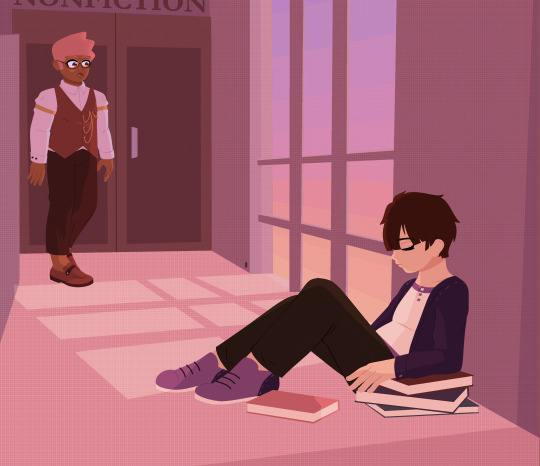
a friend who'd wait :)
#im posting this very late because i was sort of weary of how it came out and ended up messing w it until it was like 4am oops.#and i have plans tmrw so... oh well! i did my best and ill put it out while i can!#and i tried to make the scene match barnard's colors lol#finn's ocs#finn's art#i know i said id do more sillay stuff with the simpler screentone only style but i had a couple more of these in me#and this is the first piece im making thats like an actual part of the story too rather than just setting stuff for fun#i wanna write something to go with it too but for now ill just sort of briefly explain the context in the tags here:#barnard has a pretty bad case of OCD and his compulsions have made it difficult to make friends in the past#he was never outright bullied or anything but people just didnt really have the patience to deal with it#he has compulsions that include stuff like walking through doors until it feels right and needing things to be perfectly aligned#which in group settings has lead to people having to wait for him to finish his rituals and join them#they might find it tolerable at first but eventually they grow impatient and hes just... not invited to stuff anymore#but juno is a newer member of the guild who ends up frequenting the same library. hes also kinda a little weird#and they dont become fast friends or anything but just sort of naturally spend time in the same place#though they never plan meetups they eventually fall into a routine. around the same time theyd just both be at the library#and read next to each other. and maybe talk a bit. and eventually they end up walking back to the guildhall together#since theyre going to the same place after all. and juno always waits for barnard outside the door#eventually barnard asks if this bothers him. juno kinda just tells him 'of course it does' without any malice or anything. just a statement#barnard is surprised and apologizes and juno says not to. but the next day juno doesnt show up at the usual time.#barnard assumes hes committed somekinda more by bringing it up. he ends up staying there late reading to get his mind off it & not ruminate#but when he leaves juno is in fact still waiting for him down the hall (see pic) having collected a bunch of books literally abt ocd#he fell asleep bc barnard stayed later than expected. and hes an eepy guy generally. and also one very bad at expressing himself#but now barnard gets that juno's 'of course it [bothers me]' had the implication of 'but its worth it' which no friend has previously done.#and from the interaction juno was also able to understand that this isn't something barnard just does for the hell of it so. he studies.#and checks a bunch of stuff out because he thinks it could help his friend too (theres ocd workbooks and such- i remember working w them)#and thats the point where they became more ''friends'' than ''pleasant library acquaintances''#from there on they also do get into juno's problems. whole other bag of worms. but this specific scene is more about bernard from his pov#sorry about when i said briefly explain. i lied </3#but compared to the whole sequence im picturing its brief so shhh
18 notes
·
View notes
Text
DEFENDERS OF BERK | HTTYD SERIES | BREAKING DOWN HICCUP
Blog Post Series: Breaking Down Hiccup
Title: The Night and the Fury
Ep/Season: Episode 3, Season 2 (Defenders of Berk)
Premise:
Hiccup and gang set out on a training exercise on Dragon Island in hopes to train their stealth / combat skills without help from their dragons. Unfortunately, they run into a very, very unlikely "friend"...
IN ASTRID WE TRUST
It's no secret that the team needs some polishing. And we're hoping, Astrid's obstacles could do the trick. I love how they groaned, knowing that her tests is going to be difficult. It's very like them to do that and very like her to make things tough.

This exercise is fertile ground for individual members of the team to grow. For example:
(1) TUFFNUT TAKES ON THE RESPONSIBILITY OF WATCHING THE DRAGONS
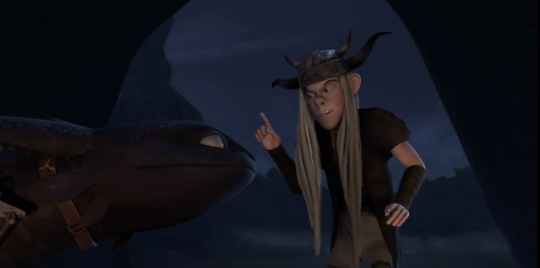
(2) RUFFNUT GOES OUT ON HER OWN
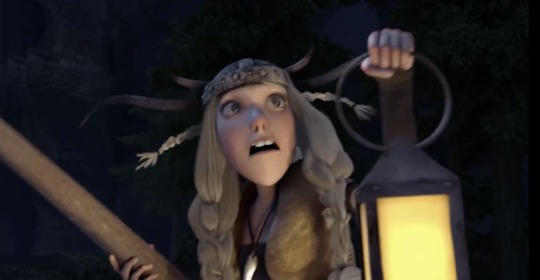
(3) FISHLEGS, WELL, IT'S JUST ANOTHER DAY FOR HIM REALLY. I.E., DOING SOMETHING HE'S SCARED TO DO
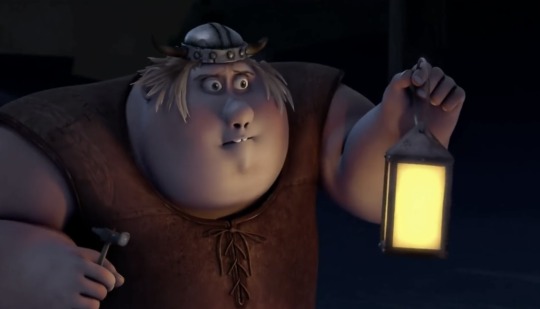
(4) HICCUP, DEALING W DAGUR
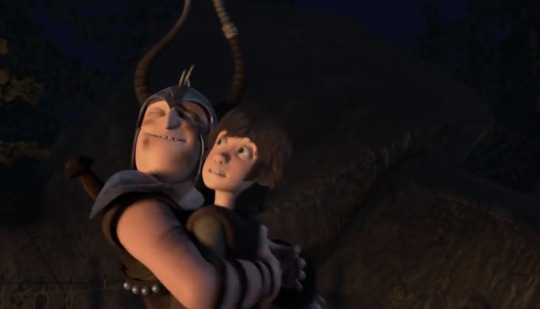
(Can we also take a moment to appreciate the little confidence boost Hiccup gives to Fishlegs? We can? Ok. Here you go.)
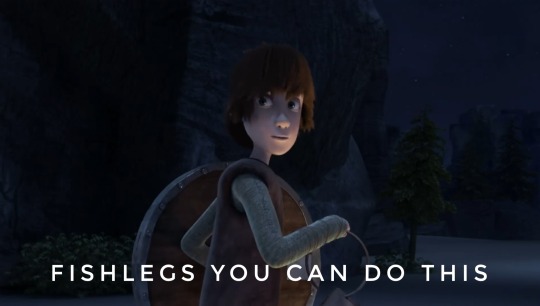
If you started watching RTTE without first seeing ROB/DOB, you might wonder why Dagur calls him brother. Well, to be fair, I still don't know why he does, but at least from this episode, you'll know when the supposed familial relationship began.

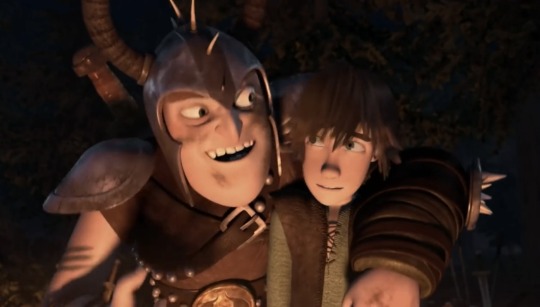

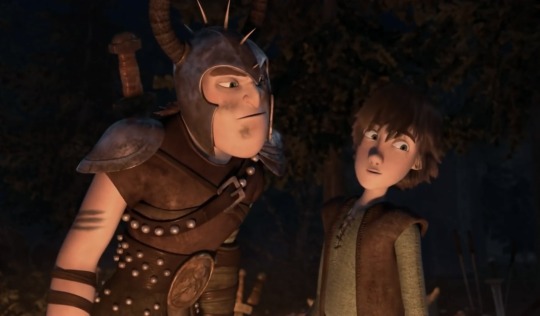
P/S: Look at how small & cute baby is.
It's also really cute that Hiccup tries, for the most part, to keep the peace with Dagur, though for the most part, I hate to watch them pandering to him.
THE DAGUR FIASCO
This episode is where I feel DOB kicks off. Hiccup's in a very precarious position. The last time Dagur showed up, Stoick lied that Berk was still at war w dragons and that they still killed them. For the sake of peace, Hiccup didn't have much of a choice but to play along and reassert the lie.
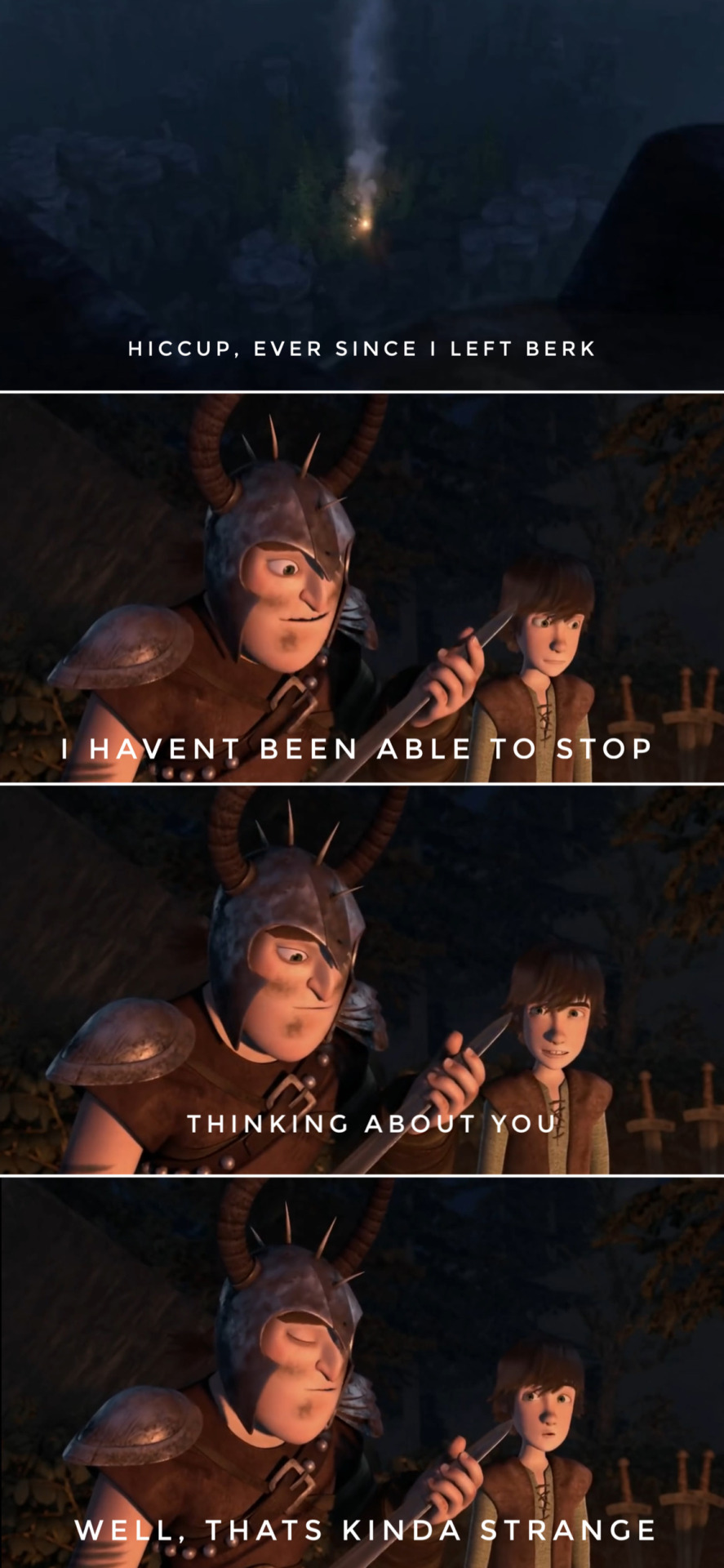
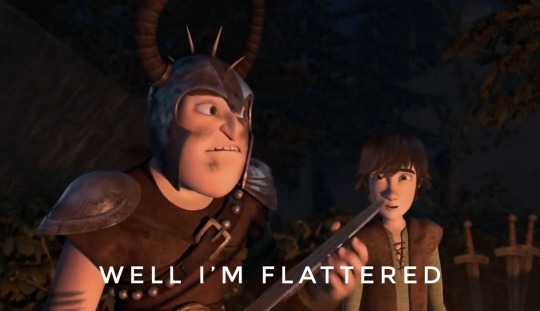
This episode is definitely one of my favourites, especially in terms of the Hiccup-Dagur dialogue.
It's hard to not enjoy the "bro-mance" sequences. Just look at this one:

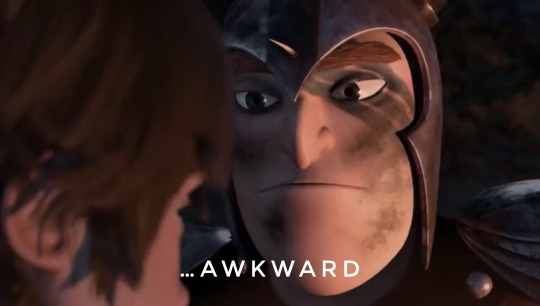

In fact, if you only watched RTTE, you might've missed where the Dagur v Snotlout situation also began. And it might surprise you to realise, that Snotlout was very much, a fan of Monsieur Deranged here.
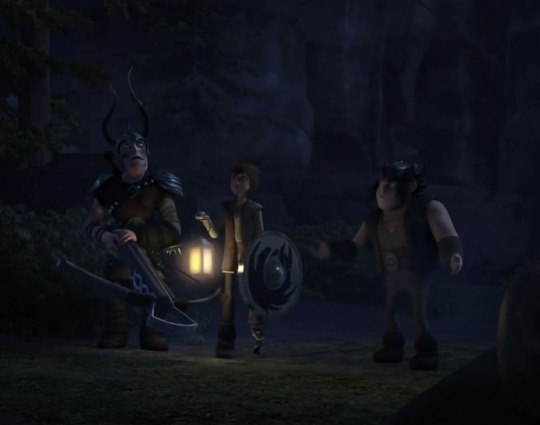
HICCUP'S STAND
But nothing beats, that moment when Hiccup takes his stand.

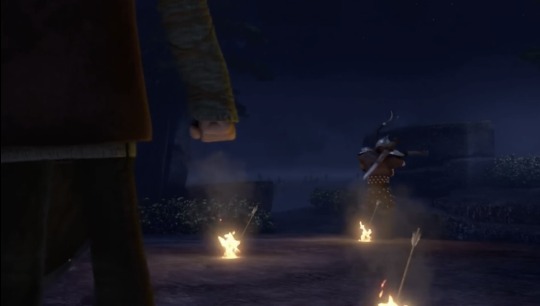
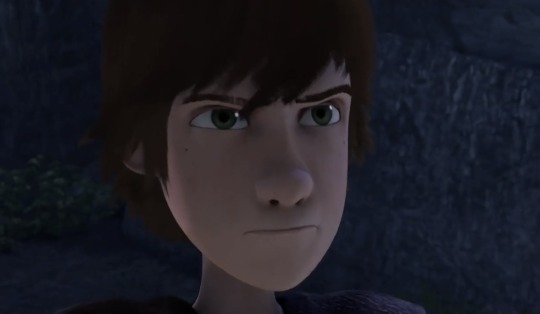
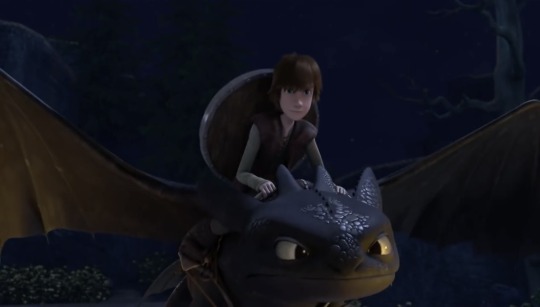
It was such a DEFINING MOMENT, because Dagur has been looking down on Hiccup for years and NOW, NOW?! He realises what a genuine threat Hiccup could be. And more importantly, how easily his pride is wounded.
I'm all here for HEROIC HICCUP. And what an artistic way to show how much Dagur underestimated him. He even underestimate his shield! Much to his lost...
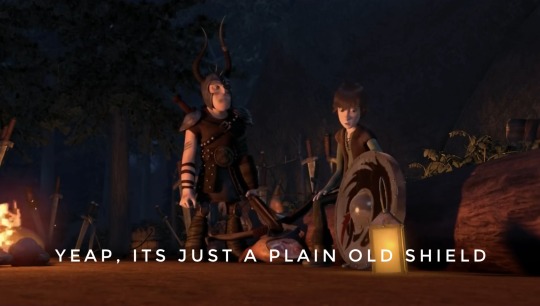
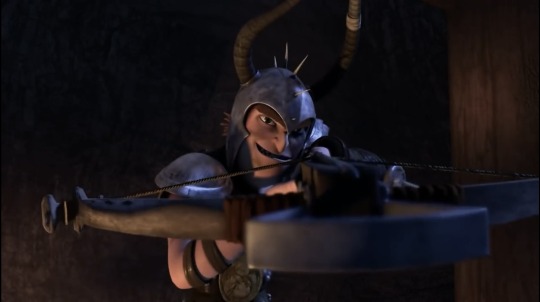

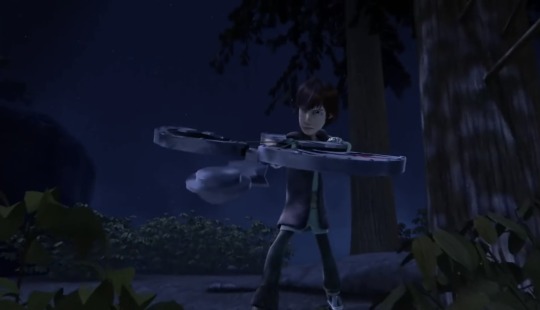
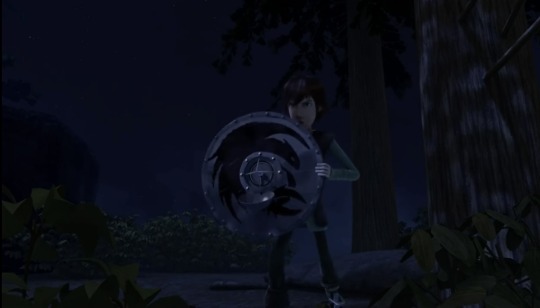
Also, don't you think that it is very Captain America of Hiccup sometimes, when he's wielding the shield?
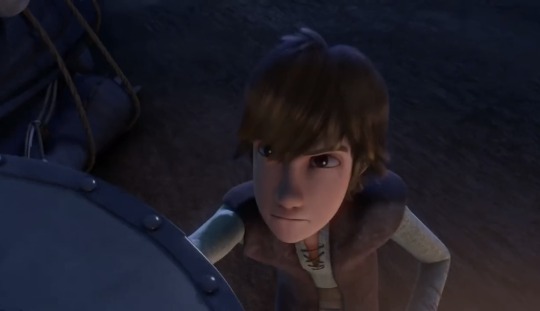

And let's not forget, Hiccup is one sassy protagonist. I mean, you know you're an enemy when he burns you.
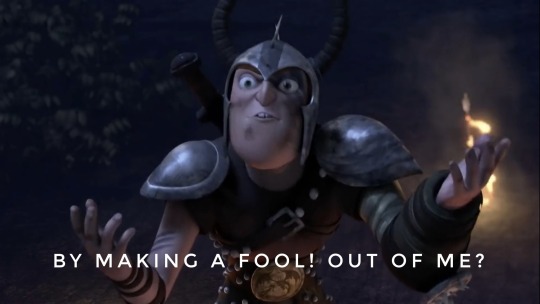
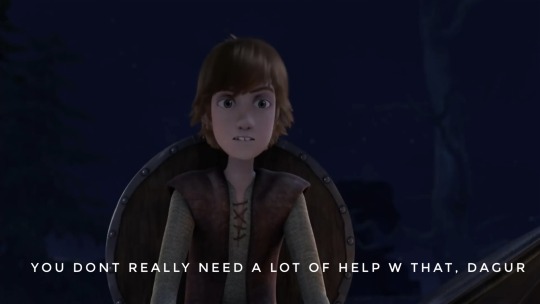
This episode is way more significant than I realised it at first. This whole time, Alvin was Berk's only viable threat. But his beef was with Stoick, initially at least.
But now, Dagur is another. And the person he's going after is Hiccup. Dagur is Hiccup's first archenemy.
And it doesn't help that he's insane.
So, what I loved about this episode was, it heightened the stakes of the entire show AND also, showcased how Hiccup can out-wit, out-smart and challenge Dagur, who I think, must've been a pretty tough contender to command the massive armada he ends up leading.
HAPPY BIRTHDAY JAY BARUCHEL (9.4.2023)
I know this may come off super random, but it is Jay Baruchel's birthday today. I think we can all agree that Jay is the life and soul of Hiccup. If you follow me on twitter @reviewinghiccup, you should know that I am down the rabbit hole of Jay Baruchel movies, interviews and podcasts.
And what I love so much about this guy is the respect and reverence he has for the show. I mean, he constantly praises it and not just because of his role, which he believes pales in comparison to the artists designing and working the animation, but its obvious that he's a HTTYD superfan.
I love it when an actor pays their respects to the franchise and I do enjoy his take on the work and how much the line between who Hiccup is and who he is, as a person, is blurred.
He's an eloquent speaker and tries to produce, write and direct movies now, instead of act in them. He's based in Canada.
Anyways, something interesting I learned about him was, in an interview w Tom Power, he talks about the book he wrote and what being a fan means to him. Him being a fan of hockey and how precious it can be to live within a franchise or something as massive as indulging interests. It sorta validates me a little, specially since I've dived deep into HTTYD fandom since changing careers.
youtube
And just like Hiccup, there is way more to this guy than it seems. He's funny, humble, kind and generous with his time. He wears his heart on his sleeve, and he's pretty jittery in real life too. But what kind of broke me, was finding out that even with his own father, he felt like he wasn't the kind of son his dad wanted.
Apparently, he had a complicated relationship with his dad which I believe may have bled into his work.
If you've watched enough of his interviews you'll know that he's had to support his mom and sister at 14-years-old with acting gigs because his father left and passed away when Jay was 21 following a drug overdose. Yet, he still remains so kind. I mean, his upbringing was tough, poor and difficult, yet you can still see him trudging through humbly, not wanting to draw attention to himself as much as he can help it.
In an interview article I read this morning, he explained that he wanted to continue being a good husband, son, brother, friend and I thought that was such a genuine Hiccup thing to say. He shoulders all these responsibilities and have been since he was a kid. Look, I don't know the guy personally, but from the expansive notes and recordings I've looked into, he seems pretty decent and I am such a huge fan.
As I grow older, I understand people on a different level. I accord respect so differently from how I would've years ago. And right now, I think what makes Jay Baruchel interesting is his sheer promise to do better for his family. And I think, in the absence of chiefing, running a village and saving the world, Hiccup is very much the same in that aspect too. A chief protects his own, which seems to be the mantra ringing in my head as I listen to Jay talk about his life.
You guys have no idea how much I know about this dude. I have possibly stalked him silly right now. And am a little embarrass as I admit this. Anyways, all I want is for him to succeed, in his work, life and family.
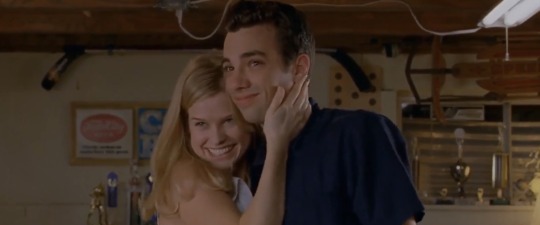
#HTTYD#DOB#Defenders of Berk#Series Review#How to Train Your Dragon#Breaking Down Hiccup#Dagur the Deranged#captain america#chris evans#happy birthday#jay baruchel#she's out of my league#alice eve#Youtube#hiccup#hiccup haddock#hiccup horrendous haddock iii
198 notes
·
View notes
Text
So one thing I’ll own up to as a prediction or interpretation I got wrong, or at least didn’t fully extrapolate out its meaning, is that Stede is the magical creature in the relationship.
Or at least that he is to Ed. That we’re getting that now that this season is more focused on Ed’s damage and we’re getting more of his POV.
(I did say in one piece of meta that they’re manic pixie dream girls to each other but this season is really bringing that to the fore.)
I definitely saw Ed as the embodiment of the adventure and life Stede has always craved. That if anything, is idealization of Ed and mistaken belief that Ed wants to continue to be a massively successful pirate (which is Stede’s dream life) is at the heart of their disastrous separation at the end of S1.
And I definitely grasped that Stede is aberrant to Ed. He’s this fascinating outsider. Ed wants to study him and even to be him such that even before he can really articulate his growing love for Stede he can speak openly of his plans to steal Stede’s life in the classic queer, “Do I want him or do I want to be him??”
But I was really pleasantly, ecstatically shocked to see just how magical Ed imagines Stede to be with that mermaid sequence.
He literally sees Stede as at least as magical as Stede sees the famous Blackbeard, and on a more real level the fabulously skilled pirate Ed Teach, to be.
I think it would be easy after S1 to see the same imbalance of power and regard for one another that Stede feels because S1 is largely his point of view. He thinks of himself as second fiddle at best to Ed. The lesser partner. The apprentice looking on Ed with worshipful awe, just glad to be in his presence and very jealous about keeping that attention and regard. It’s so easy to see in some of Ed’s projected arrogance that he too sees them that way.
But the mermaid really undercuts that. It shows just how truly impossible and magical Stede is to Ed. Literally transformational to his life in much the same way Ed was to Stede.
Yes, the “harmless goldfish” is an element in that Ed’s not really scared of Stede, he doesn’t see him as a shark or anything near a threat. He’s just a harmless little goldfish. But he’s a harmless, magical little goldfish that Ed LOVES. That he fears he’s unworthy of. Also, he wants to leave the pirate life behind so being a harmless goldfish really isn’t a pejorative at all. Ed’s afraid that no one is waiting for him, not that the person waiting for him isn’t good enough for the legendary Blackbeard.
But that’s Stede’s fear. And as we learned this season explicitly, the fear that was so terrible it drove Stede from Ed’s side was the idea that Ed’s life would be better without him in it. He’s so afraid of that he made it happen because he cares about Ed’s happiness more than his own. But he’s petrified of discovering it’s true. Frozen in inaction, literally preferring to slog through squalor than to face this fear of Ed being happier without him. It’s perverse and counter intuitive but it’s so so human.
And it’s part of why the scene where Lucius says Stede might be the best Ed EVER has guts me so much. But that’s definitely my next essay because I have so many feelings about that. That when Stede says he can’t believe that, he’s not saying it because he’s going to change it, because he’s going to make sure Ed has good days again. That’s how I think it’s taken but I don’t think that’s the literal truth of what he said. Stede literally says he’s not currently able to grasp the possibility that he’s the best Ed’s life has ever been, his low self esteem literally won’t accept it, because it so seismically alters his whole view of their relationship. That he might be not a hanger on but the best thing that ever happened to Ed?
It also throws his actions of abandoning Ed into such ugly, stark relief. He can’t accept it. He can’t. It literally doesn’t compute and the extrapolation of what that means he did to Ed if it’s true is unthinkable. He can’t think about it. He just has to fix it.
47 notes
·
View notes
Text

Yu-Gi-Oh GX Season 2 - The Fool's Journey
This is an analysis of Yu Gi Oh Gx's season 2's use of Tarot, in regerence to the Fool's Journey, specifically in regards to our proverbial fool and favorite idiot Judai Yuki, and every other Tarot card referenced in this season. Of course, this requires coming through every season 2 episode to look at each individual card Saiou pulled from the deck or referenced so pardon me this is going to be a long one.
What is The Fool's Journey
The Fool’s Journey is a sequence of 22 cards, from 00 the fool and 21 the world. It’s meant to represent the journey of the proverbial fool, a blank slate defined by both naivete and ignorance in their personal growth. In other words the fool leaves on a journey...

...to grow from a child to an adult.
In this journey each card is symbolic for a stage, person or ecounter that the fool makes on his journey of personal growth, and the fool must weather all of them in the journey he can't skip the so-called "disaster" cards like "The Devil" or "The Tower" because part of life is coping with tragedy and loss. So the fool's journey is essentially twenty-two cards that represent different encounters, events, and people in a person's life as they grow up.
Judai is the focal character of Yu Gi Oh GX, and while other characters do matter the central focus of the anime is Judai growing from his "pure" childlike self into a fully grown, well-rounded adult.
The Tarot symbolism is most prominent in season 2, but I'd argue that much like the alchemical symbolism it permeates the whole show especially labeling Judai as the fool. Make no mistake from episode 1 on he's the fool, the very first thing he does in series is run into a magician (Yugi who's signature card is Black Magician) who gives him guidance (the second step of the Fool's Journey. I'm going to quote another post here who states it better than me.
In GX, Judai is, symbolically speaking, The Fool of the Tarot Deck, the Novice Alchemist — a person brimming with infinite potential, yet one who is also supremely ignorant, who walks forward with his eyes closed and often unknowingly causes harm in his great ignorance. In this, he is very much the embodiment of the faults we most commonly associate with teenagers — selfishness, recklessness, shallowness, a lack of dedication or empathy when it’s most needed. Like most people, he has good traits that work to balance out some of the above, but his narrative path through GX ends up being that of the flawed hero undone by his faults — and then that of the atoner, the repentant sinner. In his case, the mistakes of his teenage years are the catalyst for his growth from a boy into a man burdened with duty and purpose.
Judai is a blank slate brimming with potential like the fool, and he's also an ignorant child who doesn't look before he leaps - and there are great consequences for his ignorance. Even in Season 2, a majority of the conflict could have been avoided with the Light if Judai was on the ball, instead of ignoring his friends for weeks after they were brainwashed. Judai is more often than not someone who has to be pushed into being a hero, not someone who voluntarily walks the path and this is something that lets the villains easily manipulate him. Especially in Season 2 where the main villain Saiou's gimmick is convincing the other characters that he's in control of their fate. Someone who doesn't grab the reigns, who doesn't try to control their life will see reality as something that happens to them rather than something they make with every single decision and those people are the kind who easy fall prey to Saiou's manipulations.
It's easy to see life as entirely out of your control if you don't take control. For Judai this manifests in two seasons worth of him resisting growing up and taking responsibility. As the fool he's not wise to the world and because of that, he's often caught guard by what's happening around him and the schemes of villains until it's almost too late.
The need for Judai's growth is especially emphasized in Season 3, where his "pure" nature that he's constantly praised for in the first two seasons becomes heavily criticized as a character flaw. However, the setup is present in Season 2. The first card that Saiou pulls for Judai is the fool, specifically after all of Judai's cards have gone blank and he leaves the academy. The fool is wandering in search of something, because the Fool is missing somethig. You don't leave to go on a journey if you're content and have everything you need at home.
We'll learn in Season 3 just what it is Judai is missing (*cough* Yubel *cough*) but this begs the question if Judai actually needed to reunite with Yubel. After all for the first two seasons Judai seemed to be managing fine without Yubel. In a jungian sense, yes he did because Judai in seasons 1 and 2 had yet to go through the process of individuation. It's the process by which one achieves psychic wholeness, similar to the fool's journey it's necessary for growing up and becoming one's own self.

Judai cannot continue to remain a child, nor can he remain "pure" because pure people don't exist in this world. Judai's pureness comes from a mix of innocence and ignorance, because he's quite literally forgotten some of the darker memories of his past (like Yubel quite literally sending all of his friends into comas until everyone became scared of him) and also from a refusal to "get smarter' or "grow up" on his end. For example does all of the trouble Judai faces in Season 3 come entirely from Yubel, or does Judai also struggle because behaviors that are okay when your first year of high school and still growing become less okay in your third year?
Judai's childish and pure heart that makes him the fool is both his greatest strength and weakness, his strength because he's optimistic, open to new experiences and generally trusting of people which makes him so easy to befriend. However it's a flaw when Judai's childishness turns into childlike selfishess, when his ignorance leads to him making foolish, impulsive decisions. Judai's downright refusal to think, about other people's feelings, about the consequences of his actions leads to great suffering later down the line. After all in the art of the Rider-Waite Tarot card, the Fool is taking the first step of their journey blithefully unaware that they're about to walk right off of a cliff.
So the Fool's Journey is something Judai must complete to grow up and complete his character arc, because the fool may be innocent, and pure of heart, but they're also empty and empty things need to be filled. Each of the cards Saiou pulls this season, are representative of Judai's journey throughout season 2 and some of these are going to be characters, because some of the cards represent people the fool encounters.
Destiny
Before I start breaking down every single tarot card that Saiou pulls, I also want to go into why Destiny is such a huge theme in season 2. There's Saiou's ability to see the future, the multiple tarot cards that are refereced, Saiou's entire deck archetype being based around the major arcana with "Arcana Force" monsters, Edo's obsession with Destiny, the "D-Heroes" or Destiny Hero Archetype that Edo plays which work around the concept of effects that manipulate time (such as sending a card two turns into the future, or flipping over a spell card on your deck to use next turn.)
This season isn't just a typical "there's no such thing as destiny, you can change your fate if you want to" story, because of the way it uses tarot symbolism / Jungian Symbolism. Basically the whole theme of Season 2 (and the leadup to Season 3) boils down to this quote.
“Until you make the unconscious conscious, it will rule your life and you will call it Fate.”
CG JUNG
The biggest example of this is Edo, who is also someone who desperately wants to believe in destiny, and that he's a person chosen for a great destiny at the beginning of the season.
Edo’s obsession with destiny comes from not wanting to confront his past and his inner wounded child. If he believes he’s a chosen hero on a quest for revenge, he doesn’t have to confront what DD pointed out that he’s still the grieving child who lost his father.
Since Edo ignores the unconscious, he is for most of the story a pawn in some way or another. He’s a pawn to Saio believing and following his prophecies, he’s a pawn to DD who killed his father never once suspecting him.
Characters who ignore the unconscious, become pawns of Saiou / the Light. What this basically means is that if you are not aware of a flaw you have, you'll be sabotaged by it in some way. Problems don't usually go away by ignoring them after all as nice as that would be. In Jungian symbolism the shadow is made up of the flaws that you would rather ignore or not confront, and all other parts of the personality that you're not aware of. Confronting the shadow is necessary for individuation which is the same goal as the Fool's Journey. Saiou's strategy is to duel someone, exploit some subconscious flaw, Manjoume's inferiority complex towards Judai, The pressure Asuka feels to conform, Misawa's desire for validation and praise from his peers. Once he's exploited that flaw he brainwashes them with the light, because while being controlled they don't have to think about that flaw. Since they don't want to confront their flaw / shadow and it's easier to just keep o ignoring it then they become pawns to destiny.
Now, for the breakdown of every card that Saiou references this season.
53: Destiny Begins The Freshman Edo Phoenix
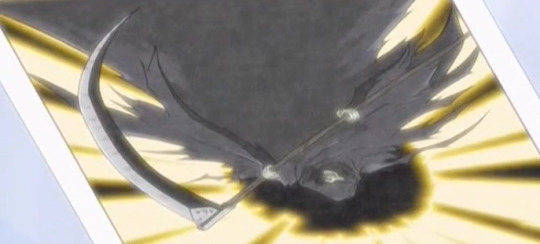
Pull #1: Death in Reverse
XII - Death I am Wary
Death doesn't mean literla death, but rather change. Dath means change. Death means change. Death means change. Means change.
However, Saiou pulls Death from the deck inverted. You have to have death to have rebirth. If it's inverted then it's stagnancy. It's refusing to acknowledge change, or in some cases it's refusing to grieve and because of that you're unable to move on or move forward.
The situation that Saiou pulls this in is during the middle of Edo's duel with Judai. A duel that Saiou set up, and then told Edo to lose, which Edo obeys because up until a certain point he's always done what Saiou's deck told him to do - because of his firm belief in destiny.
Death in reverse in this case is Edo - because his desire to belief in destiny comes from his refusal to grieve or move on from his father's death. If he believes that everything is predetermined and he's a chosen one, then he's not some sad orphaned kid, he's a hero with a great destiny ahead of him.

Edo is the one refusing to acknowledge death, and refusing to grieve, and therefore he's the one who is stagnating at the start of the story.
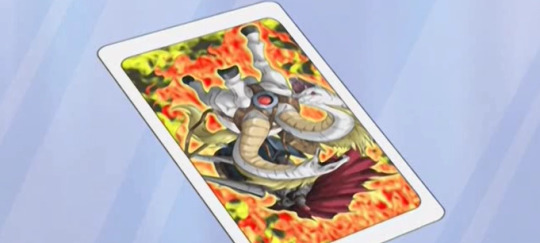
Pull #2: Chariot in Reverse
VII - The Chariot I am Driving
The chariot is the card of ambition, action, energy and most of all control. In the rider waite tarot the image is of a hero riding the chariot. However, in reverse it means a hesitation to grab onto the reigns and take control of your life.
This is once again in reference to Edo, who because of his belief in destiny leaves all the decision making up to Saiou. Edo who would normally be a very strong, ambitious, willfull individual is easily manipulated by Saiou because he refuses to take the reigns into his own hands.
The chariot in reverse can also sometimes mean chaos, as in someone who refuses to take control of his life in an "I do what I want" sort of way. In that case it could be referring to Judai, especially the way Judai's extremely self-centered egotism, only dueling for fun compares to how Edo who is always carrying massive burdens on his shoulders and believes a hero has to carry such things (in spire of the fact that Edo is essentially still a child, just a child playing at being an adult). Saiou says that a encounter with Judai is necessary for Edo's growth and that's true, because Edo just like Judai is still a child, but Judai's aware of that fact whereas Edo thinks he's an adult when he's not. Sometimes the first step to growth is taking a good long look in the mirror.
57: The Kaiser vs. Ed

Pull #1: The Chariot - Upright
I already elaborated on the Chariot's meaning above - but it's upright this time. There's an interesting line where Edo says he was going to win his first duel with Judai until Saiou ordered him to lose. Which implies that it's not destiny at play here, but rather Edo's belief in destiny which influences his choices.
The Chariot could also be a reference to Hell Kaiser Ryo. As the sense of loss and powerlessness in this episode that Kaiser experiences humiliates him enough that he has a full breakdown and becomes obsessed with achieving victory above everything else - much like the triumphant hero holding the reigns of the chariot.
Unlike other characters who fall prey to possession (Fubuki, Asuka, Manjoume, etc...) Ryo repeatedly emphasizes that he's not being possessed by darkness internal or otherwise, his apparent change in behavior is the result of his own decisions. Ryou for all of his flaws is much more of an adult than Edo who's being controlled for more than half of the season because of his belief than destiny, he takes responsibility for his own choices when others like Fubuki try to make excuses for him.

In that sense he embodies the chariot much more than Edo as it's the card of having both hands on the wheel. Though once again the chariot in reverse is the perfect card for Edo, because Saiou's trick is convincing people they're not in control of their destiny which is when he starts making all of your choices for you.
61 - Enter Saiou the Tarot Deck of Destiny
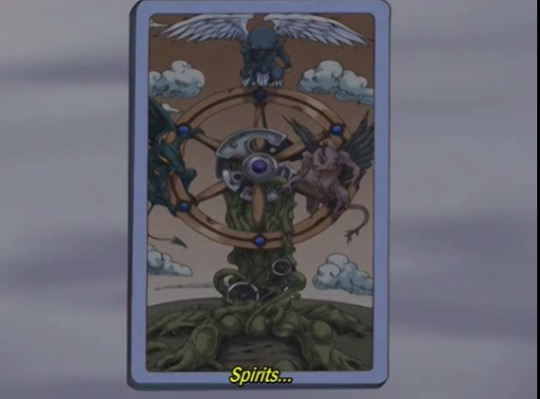
He is a duelist who is able to communicate deeply with Duel Spirits - or so my divinations tell me.
X - Wheel of Fortune: I am changing
Saiou pulls this card after Judai's deck has been bleached, when he's standing on the precipice to leave Duel Academy where he'll later have an encounter with the Neo-Spacians. He doesn't name the card, but it's clearly the Wheel of Fortune, he later pulled the card in association with Edo when he believed Edo was the one who could change his eventual fate.
Here Saiou pulls the card while ruminating on Judai's connection to the spirits. In context he believes the spirits are what's protecting him from the fool as pictured above. I went into great detail for how the fool represents Judai so let's skip that to stop from repeating myself and focus on the Wheel of Fortune.
The wheel of fortune is chaotic chance by the ordained power of gods and the celestial heavens/earth. It's also a card heavily associated with Alchemy.
“The Waite-Smith Wheel of Fortune is fourfold in construction, signaling all that is known in the world of matter: directions, elements, Kabbalistic worlds, fixed signs of the zodiac, etc. Spaced around the wheel’s rim is the divine name, , counterchanged with English letters. Most will instantly pick up the word TARO(T)—sometimes called the “book of fate.” But you might also see ROTA (“wheel”), ORAT (“speaks”), TORA (the law or “Torah”), and ATOR (“Hathor”). Alchemical glyphs adorn the axes of the circle. At the top, mercury’s symbol; at left, the salt symbol; at right, the sulfur symbol. These three are the tria prima of alchemy. The glyph at the bottom, though it resembles the Aquarius glyph, is more likely the alchemical sign for multiplication, a process by which the alchemical product becomes more voluminous. Or the four symbols may be elemental: mercury/air, sulfur/fire, salt/earth, wavy final glyph/water. Atop the Wheel is the enigmatic sphinx. Modern tarot scholars consider the yellow descending serpent to be monstrous Typhon and the red “devil” figure to be jackal-headed psychopomp Hermanubis. The Kerubic beasts from Ezekiel 10 occupy the card’s four corners; their books may be the Gospels: Lion[…]”
Excerpt From Tarot Deciphered T. Susan Chang
The connection to divine aspect in this context is Judai's connection to the spirits. However, pulling the Fool right afterwards is interesting because it's the card of ignorance. Judai doesn't know why he's connected to the spirits because he's forgotten, both his childhood connection to Yubel and the fact he could see spirits long ago. This is a plot point that's foreshadowed three times, first Judai telling a scary story to his dormmates of when he used to hear spirits in his childhood, then in season 2 when he suddenly remembers entering the Kaiba Corp contest for the Neo-Spacians, that's only half the story though as in season 3 Judai begins to question when he first saw spirits until he finally remembers Yubel and sending them away on another satellite.
The last card he pulls is the hanged man which is a card tied directly to Manjoume. Manjoume is Judai's foil in a sense. Saiou even uses Manjuoume as a replacement head of the cult something he originally planned for Judai. Manjoume also primarily wears black, a color associated with Nigredo. Nigredo is the first stage of alchemy the where most of the impurities are boiled out until the alchemical mixture turns pitch black. Manjoume similiarly, is a character who carries around an inferiority complex and constantly battles with his low self-worth and the pressure to succeed unlike Judai who spends the first two seasons repressing all those feelings.
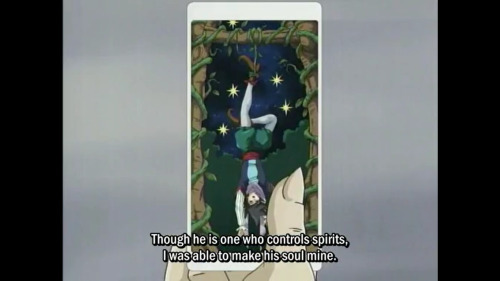

XII - The Hanged Man I am releasing.
Some people argue that Manjoume has no character arc past season 1, but I'd argue being the villain exploiting you with your worst insecurities and flaws is impressive character work because we learn a great deal about Manjoume here.
The hanged man is the card of surrender to outside forces, the card of taking time to contemplate, and also the card of self-proclaimed martyrdom.
There is more than one religion that speaks of a man hanged from a tree. Mithras in roman mythology, Odin from Norse, Jesus in Christianity, and Osiris from Egypt. This card is often interpreted as a representative of martyrdom - the more accurate word other than a martyr is sacrifice.
One of my friends recently shared this with me: "Remember that surrender is an act of will. It is a choice to unclench one's fist and hang oneself upside down and stay there."
Kitchen Table Tarot
The use of the word "Sacrifice" is ironic here, because Manjoume is basically used as a human sacrifice to become a vessel of the Light of Destruction.
Using the Hanged Man as the Self-Made Martyr is meaningful here too, because Kenzan proves that losing a duel to Saiou doesn't automatically result in brainwashing. My theory on what makes others fall prey to the light's influence is when they accept Saiou's words about their inner desires, essentially falling prey to their insecurities. The light is a relief in a way to those riddled by insecurities they don't have to to think about the things that worry them if they're brainwashed. If you think about it, Manjoume is exploited for his inferiority complex, Asuka is forced to conform into a more feminine role, and Misawa joins a cult to get validation from his peers after they start ignoring him.
The Hanged Man is all about the choice to hang oneself, and while Saiou is incredibly forceful including using the surrounding plant life to hang Manjoume the card ultimately implies it was Manjoume's choice ultimately because he kept judging himself on his ability to beat Judai instead of just looking at his own merits.
You have a rival that you wish to surpass. However, deep within your heart you have all but surrendered. That's not all, you even entice him with friendship in order to prolong your battle.
Yes stagnation stemming from a failure to defeat Judai. You cannot continue like this. That said, you happened to pull he who hung in reverse. This foretells progress from stangation.
The choice to stop believing in his own cards and accept the cards that Saiou gave him was ultimately his own in that moment. As evidenced by the fact that Manjoume is able to throw off his own brainwashing later on and take the Ojamas back.
In the duel itself the hanged man arcana force card lands in reverse, and the meaning is exactly as Saiou states it, stagnation, but a stagnation you have to make the decision to pull yourself out of. "That said you happened to pull he who was hung in reverse. This foretells progress from stagnation. Yes - one can choose their destiny."
Of course the irony here is Manjoume's not really making the choice to escape stagnation here, because he's accepting Saiou's will over his own.
62 - A New E-Hero Neos!
This time a card falls out of Saiou's deck, which is something that happens in real life all the time actually when I'm doing readings. Which is a fun little detail the creators threw in. The card itself is death, it falls in a diagonal position ambiguous to whether or not it's upright or reverse which Saiou terms "rebirth if reversed, destruction if upright."
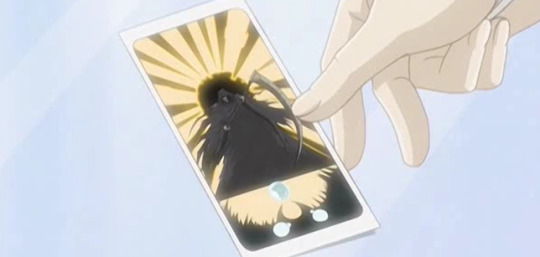
XIII - Death "I am Weary"
Saiou's reading of the card is a little weird. Death in Tarot is the card of Death and Rebirth in the sense of change. Destruction is more in the wheelhouse of the Tower.
Of course his reading could be referring to the necessity of letting things die, in order for change to occur, whether they be old ways, old ideas, etc. Death in reverse isn't rebirth though, but rather stagnancy and the resistance of destruction.
The definition of Death here does fit with the alchemy symbolism surrounding Judai's character. The main philosophy of alchemy is "Dissolve et Coagula" which basically means death and rebirth. A person is dissolved and reformed into a purer metal until eventually alchemical gold is formed. Judai is in fact a character that has been resisting death, because he spends basically two seasons a stagnant character and his immaturity as a result of his lack of growth is a big focus of season 3.
In the Fool's Journey the death tarot card is all about accepting both grief and death as inevitable facts of life.
The Fool now begins to eliminate old habits and tired approaches. He cuts out nonessentials because he appreciates the basics of life. He goes through endings as he puts the outgrown aspects of his life behind him. He process may seem like dying because it is the death (13) of his familiar self to allow for the growth of a new one.
Learntarot.com
Clinging to the familiar self is definitely a way to describe Judai. One of his biggest flaws is his tendency to settle into a comfortable status quo and take things for granted. Hence why he takes so long to try to save his friends from brainwashing in this season.
"It is the ego that sees itself as separate from life; because it is only a mask the ego does not wish to die. It wishes to make itself superior to the universe. If we accept death we will be able to live more fully. The ego never wants to release energy, it wants to hoard it more fully, as a result new energy cannot get in. "
Seventy-Eight Degrees of Wisdom: A book of Tarot
Jung even defines death of the ego as something necessary for growth. In The Archetypes and the Collective Unconscious (1959; 2nd ed., 1968), Jung characterized ego death (which he referred to as “psychic death”) as a fundamental reordering of the psyche with the liberating potential to reset human consciousness so that it might better align with the “natural” self.
Which you know season 3 foreshadowing again, Judai accepts death in himself in quite a literal sense as the end of the season he dies and is reborn as a new being entirely.
I'm probably reading too much into it, but it's pretty clear Yubel was the plan at this point, considering both the season 1 Judai seeing spirits in his childhood, and the launching trading cards into space are both things that get added into Yubel's eventual backstory.
70 - Asuka Vs Manjoume White Thunder

The upright Hierophant! It refers to someone who will be of use. Could this mean that it is Judai Yuki and not Edo Phoenix that I need?
V - The Hierophant I am unlocking
In this scene Saiou directly states the card could be referring to either Edo or Judai. Sorry Asuka no card for you this episode (if I had to assign her a card it would be the high priestess passive, feminine inspiration who appears after the Magician she is basically the first friend Judai makes and one of his first duels when he comes to Duel Academy). The hierophant is also the masculine counterpart to the high priestess so that's more evidence for Asuka being subtly marked as the high priestess.
Saiou first pulled the Hierophant in the past shortly after meeting Edo, to show Edo his belief that Edo can be the one to change the terrible future he's predicted for himself.
The hierophant sits between two pillars wearing three robes - red blue, and white - and a three-tiered crown, both erepresenting the three worlds over which he rules (the ego, the id, and the supergo). In his left hand he holds the Papl Cross. He raises his right hand in a blessing, with one two fingers pointed to the Heavens and two to Earth. This represents the connction between man and the divine. While the crossed keys at the Hierophants feet represent the balance between the conscious and subconscious minds. Overall it's a card for a figure that appears and offers you guidance.
A card that is appropriate for Saiou who's conscious and subconscious minds are completely out of whack. The state of Saiou's possession is left a little bit ambiguous in the text. Saiou claims he's completely controlled by the Light of Desstruction, split into two entirely seperate halfs ala Marik and Dark Marik. His good half does in fact go to Edo and help him in the duel. However, the Light of Destruction claims that he is Saiou, and he's enacting Saiou's vengeance against a world that shunned and feared him for his powers. However, either way the fact that Saiou has divided himself into two distinct halves shows a serious imbalance in his conscious and subconscious he wishes Edo to help him fix.
Before the Hierophant kneels two followers. The hierophant's role is to pass down spiritual wisdom. That's likely the Judai part of the card.
I read something that likened the Hierophant to trickster gods. What's this? Coyote, Hermes, Fox, Loki - they take information that we can't quite wrap our heads around and make it discernible. The Trickster is the messenger between the gods and Man. Stealing fire, teaching us forbiddensecrets, giving us an apple. Joseph Sober called the Hierophant "He who shows the Sacred" in The Book of Oracles, or A Poet's Tarot.
If the Hierophant is linked to trickster gods as well then that's the Fool / Judai's role, also as the character who acts as the messenger between spirits and humans which is Judai's role as Edo can't see spirits. Linking both Judai and Edo to this card also foreshadows Judai's eventual role as someone who becomes a guide to help Duel Spirits and Humans coexist.
Judai is also much like Edo, someone who's conscious and subconscious minds are completely out of whack. All of Season 3 is a balancing act for the 3 parts of Judai's soul, Judai (Ego), Supreme King (Id) and Yubel (Superego). The entire duel between Edo and Saiou is basically setup for what Judai must do at the end of Season 3 when facing Yubel when it's time to find balance in his soul (and Yubel is definitely his soul).
Judai is the guide between spirits and humans, but he's still in the process of learning how to guide others something that takes him about four seasons because Judai is a slow learner.
73 - Kenzan VS Saiou! It's Dinosaur DNA, Don
Saiou starts the episode with a four card spread, card one wheel of fortune, card two the fool, card three the hierophant three cards we've already covered and four is The Strength which refers to Kenzan.
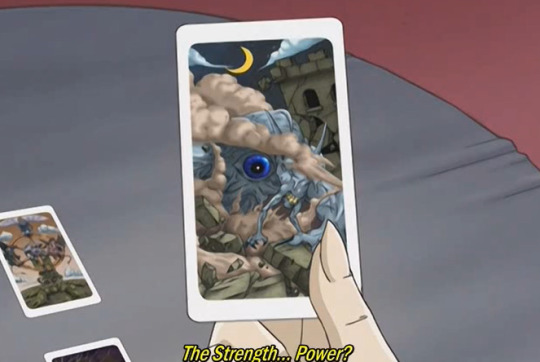
And what is this card that accompanies the Fool? The Strength... Power? A symbol of unwavering Power. Do I take this to mean this one might also affect my fate?
VII - The Strength I am graceful.
That sure is interesting card art for the Strength. For the most part Saiou's cards resemble the Rider Waite decks, a religious leader for the hierophant, a fool for the fool, a figure on a chariot pulled by a two-headed figure (as opposed to two lions), Death shows a figure of Death (in Rider-Waite it's the pale horseman but in other decks it's just the reaper himself) but the Strength Card is traditionally a woman in a white dress taming a lion. The white dress is purity, the infinity symbol atop her head an endless supply of strength, and the act of taming the lion itself is feminine energy controlling the lion a symbol of untamed beastly power. Saiou's card art looks like some sort of alien crawling out of the earth with a crumbling tower and the moon in the background.
It's most likely just a reference to Saiou's alien-like / eldtrich inspired Arcana Force cards, which mixes the major arcana with lovecraftian lore to reference the alien nature of the Light of Destruction as an unknowable force from outerspace tampering with earth. Since the Strength is about taming beastly power, the representative of powr isn't a lion, but rather an alien like the strange Alien force Saiou gets his power from - which makes sense as Kenzan is the first character we're shown able to conquer the light on his own.
As I stated above it's ambiguous whether the light is straight up mind control, or just a corruption. Saiou seems to be possessed as in there is an alien force in his body controlling his body like a puppet, but the Light itself claims some part of Saiou too wants destruction. It's different then the way Yubel possesses people, which is just quite literally using their body as a puppet. Johan isn't even inside of his body when Yubel possesses him he gets shoved into a card, Yubel / Johan isn't a reflection of any of Johan's desires or internal darkness. Yubel themselves are referred to as being corrupted by the light, but they're clearly not possessed their actions are their own no matter how twisted they may be. In that case the Light is more mental damage that comes from enduring painful torture for years on end.
In Duel Links, Yubel has an encounter with Saiou where Saiou detects the light's influence on Yubel and asks them to join in his mission only for Yubel to turn them down.
Saiou: Let us fill the universe with light together.
Yubel: No.
Saiou: What?
Yubel: I don't care about the light. I don't care about you. I only care about Judai.
Which is evidence that the Light doesn't fully possess you so much as corrupt what's already there, Yubel already had an unhealthy fixation on Judai before this and the Light made it so Yubel and Judai were the only two people in the universe that mattered in Yubel's eyes.
The point of this long tangent is that this episode shows once again that people can resist the light. As Kenzan is the first person to successfully do it, he shows that losing a duel =/= possession. Misawa wasn't even going to lose his duel, the pressure to conform and join the cult with everyone else because he wanted to be recognized by his peers just made him lose on purpose.
The Light and season 2 as a whole is a reference to the Albedo or the Whitening phase of alchemy, the second stage where the metal has been cleansed of all impurities. Similiarly, the Light seems to work by promising to cleanse the characters who fall victims to it of their impure thoughts, ie their insecurities because while being brainwashed for the whole season more or less the characters brainwashed are succumbing to flaws that are a part of their arcs for the entire show.
Manjoume is constantly battling against his inferiority complex, which is both a springboard that motivates him to get stronger but also sabotages any self confidence he might build up for himself. Asuka is continually fighting the constant pressure of Duel Academy and sometimes even the people around her like Fubuki, telling her to conform to more a more feminine ideal, the conflict between perceived obligation to fill others expectations vs. doing what you want in life. Even Manjoume and Asuka's duel is Manjoume basically brainwashing her because his subconscious romantic feelings and longing towards her makes him want to brainwash her to being his queen at his sides -> forcing her to conform to femininity when previously she responded to his feelings by telling him she didn't have room for love in her life because her first love was dueling. Misawa presents himself as an island who only cares about dueling and intellectual pursuits, but both Tanya and the Light reveal how much he needs love in his life.
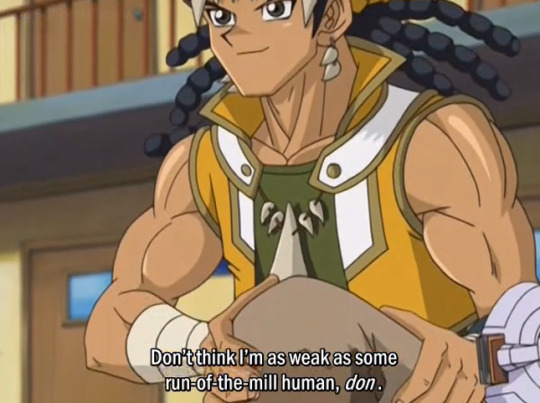
When Kenzan resists the light's brainwashing he claims it's because of his dinosaur DNA, but it's more than likely Kenzan himself - his upbeat nature means he doesn't have the same insecurities that Alexis, Manjoume and Misawa have. In season 3 when he's used as a part of the sacrifice ritual to create super polymerization he even says that he's never felt such strong hatred before. Not to say Kenzan's without flaws, he idolizes Judai way too much, but he's also achieved a peace with himself other characters haven't b/c he's tamed his wild side.
You could also tie Jim Crocodile Cook in Season 3 to the strength, because he's heavy foils with Kenzan, Kenzan uses dinosaurs and Jim uses fossils, they're both tied to earth, they both are good-natured guys who value friendship and loyalty above else. Jim also plays a big role in taming the beast when it comes to the fight against the Supreme King / Haou and Judai's inner darkness. Since the Shadow in a Jungian sense is composed of all the hidden parts of our personality, including the beastial instincts that are suppressed by the ego. Jim and Kenzan by embodying the strength card, display find a balance between the ego and the shadow that other characters lack.
The fact that Jim and Kenzan also both conquer this darkness / light respectively shows that in the end it is the character's choice to succumb. Judai when succumbing to the supreme king is SHADOW POSSESSED which is a Jungian term where unaware of our worst flaws we become essentially possessed by them and unknowingly keep committing the same mistakes.
As stated above until you make the unconscious conscious it will rule your life and you will call it fate. The same mistake every character who falls victim to Saiou makes, believing fate is something that happens to them because he called a few coin flips right in a duel rather than something they create with every single decision they make.
Supreme King Judai snaps and decides that nothing else matters except for power and that if he already lost four friends to it he might as well finish Super Polymerization. He's not being puppeteered or controlled though, Judai is falling prey to his worst instincts but it's still Judai making the decisions here. Which is the same for characters possessed by the Light, ultimately Manjoume, Alexis and Misawa have to throw off the shackles themselves. Which makes these possessions part of an arc and not just the characters being reduced to agenciless puppets for half a season (no that's the zombie thing in the third season.)
They key to doing this is embracing your wild instincts / your shadow and taming them rather than trying to repress them entirely. For Manjoume it's throwing his black coat back on and embracing the fact that he's a messy person full of pride and flaws (which is color symbolism b/c the black coat is Nigredo, but also just funny because he doesn't wash his coat), for Asuka it's embracing the fact that she doesn't fit the ideal of queen of obelisk or the stereotypical unemotional ice queen because she has too many fiery emotions (elemental symbolism and color symbolism). The light tries to rid you of your shadow, but you actually need your shadow to be a whole person b/c all those niggling little flaws are a part of who you are.
97 - He Appears! The Mysterious World Champ

"He's actually searching for his father. I understand how he feels. Every man sees his father as someone to surpass eventually. However, Ed had his father taken from him by a murderer. If he wants to surpass his late father, he will have to defeat that crimminal. That's what he believes. That's why he searches so fervently for an opponent to surpass in his father's place."
There's no tarot card pulled in this episode, but these two episodes take a right turn from Jung Territory right into FreudVille with the insanely oedipal speech the principal gives about Edo's relationship with his father.
Oedipus Rex is a play about many things, chiefly family ties and fate. Oedipus hears a prophecy about killing his father and bedding his mother, so in horror he leaves his home. On the highway to thebes he gets in an argument with a man and kills him on the side of the road. Then in Thebes he solves the Sphinx's riddle and is proclaimed a hero and a king for saving the city. He marries the recetnly widowed queen and has several children with her.
Years later a plague falls upon the city. He summons the prophet Tiresias to tell him who's behind the plague, and Tiresias the blind prophet tells him that he doesn't want to know the truth. Oedipus eventually discovers that he was adopted. That his birth parents heard the same prophecy that he would kill one and bed the other, and decided to leave him on a cliff to die - only for him to be saved. The man Oedipus killed on the side of the road was Laius, the former king and his father, and his wife Jocasta is actually his mother.
Oedipus is revealed to be the culprit of the plague in Thebes all along, because he unknowingly killed his father and bed his mother. Ironically, it's also Oedipus's attempts to defy his fate that lead him to committing the sin he was prophesized to do. Oedipus believes himself to be the hero trying to solve the plague in Thebes only to learn he's the very cause of the plague.
Freud believed Oedipus Rex to be a play that speaks to a fundamental truth of the human subconscious, and named the Oedipus Complex after the play. The Oedipus Complex is a Freudian Term that states a boy develops an unconscious infatuation towards his mother and simultaneously fears his father to be a rival.
Edo doesn't even have a mother so the incestuous interpretation doesn't really apply here. Freud can be interpreted another way though, basically the first relationship we ever experience is with our parents, and the relationship we have with our parents teaches us about all other relationships in life (google attachment styles / theory this is a well studied phenomenon).
The principal takes the heavily Freudian interpretation that Edo can't grow up because due to the fact that his father died early, he never surpassed his father as young boy's due. Edo is still stuck in this stage of immaturity where he views his father as a rival because his father was taken from him too early.
Edo also symbolically kills both his father and his adoptive father in defeating DD and killing the remains of his father's soul that was in Destiny Hero Blood-D! in order to finally grow up. Symbolically he's killing his father like Oedipus, but in actuality what he's doing is choosing to let go of the feelings of the past that controlled him for so long and move on. In order to grow up you have to symbolically kill your parents, or at least in childhood your parents have control of every aspect of your life and seem all knowing and part of growing up is separating from your parents, taking control of your life and making your own decision.
Edo is more closely tied to the fate aspect of Oedipus Rex, in the sense that Edo believes himself to be the hero of the story that is center to the narrative but is blinded to the truth all along. He is even at parts the villain of the story, because for so long he helps Saiou's machinations by willingly choosing to be his puppet because he wants to believe he's a chosen, destined hero so badly.
Much like Oedipus, Edo (oh my god... is that why he's named Edo) spends his entire arc searching for the culprit when the culprit has been right next to him all along. He even gets used as a part of the culprit's plan, because DD encouraged Edo to search for the person who stole Bloo-D in order to spy on the police investigation and make sure Edo didn't get close. Edo, like Oedipus believes himself to be the hero of the story.
But maybe, being chosen by fate isn't a good thing. Oedipus technically is a hero, but he's the hero of a tragedy. He's chosen by fate, but that fate means he's ultimately helpless and agenciless destined to commit a horrible disgusting act he doesn't want to do. All of his attempts to avert his fate and exert his free will just end up with him fulfilling that horrible fate instead.
Edo wants to believe in destiny because of his childish belief in heroes, and his need for heroes to exist because his father's killer went unpunished. He also copes with the reality of his father's death by creating a fictional narrative, he was the hero, his father's death is his tragic backstory, and one day he'll avenge his father and get revenge because that's how stories go. Once again though to be a character in a story is to have no agency, because characters don't have control the authors do. Characters are just tools of the narrative, just like how Edo spends so much of his arc a tool of Saiou, and DD.
When DD is justifying himself and his actions in killing Edo's father he sounds a lot like Edo, proclaiming himself one of the chosen ones.
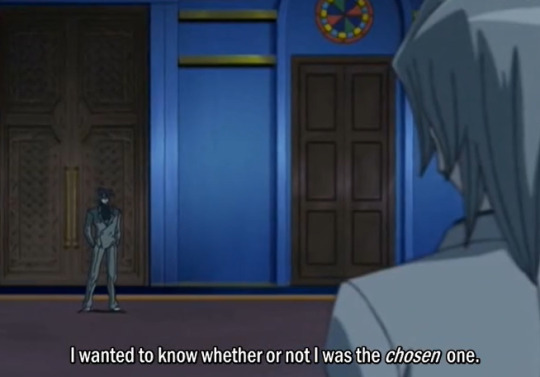
DD:Self-interest? Not quite. I wanted to know whether or not I was the chosen one. Just look at history - all the greats who seized power would always commit some number of crimes. In killing your father, I became a great myself and I proved my status as the chosen one.
Edo: You've lost your mind!
DD: Edo, I wouldn't expect a commoner like you to understand. The path of a great is a unique one, after all - one devoid of laws and common sense.
DD's logic is a reflection of Ed's, and also Saiou's, as all three of them believe themselves to be chosen by a special destiny, and in all 3 cases it's actually a terrible thing to be a chosen one. DD is even split down the middle just like Saiou, and it's implied for all the victories Bloo-D brought him he might just be possessed by that card, an angenciless tool just like Saiou is to the light.
In Season 4 Saiou even succumbs to his flaws and turns against Judai because he can't stand to be powerless, and getting his powers to see the future back is in his eyes worth the possession it might bring too. All three of these characters want to believe in a fixed destiny because it makes them special, but by believing in fate they also give up their ability to make choices and become tools. Until you make the unconscious conscious, it will ruin your life and you will call it fate.
Even Saiou's narrative of gaining revenge for his father turns out to be unsatisfying in the end, after his long quest for revenge all he accomplishes is finding out his adoptive father never once cared for him all along, and he has to kill the last living memory of his real father. The revenge that he thought would bring him closure just rips the wound right back open. His narrative is proven false and Edo is shown not to be a hero as he imagined himself, but just a child who's failed to grow up, or grow past the day his father was killed.
100 - The Ultimate Arcana, The World
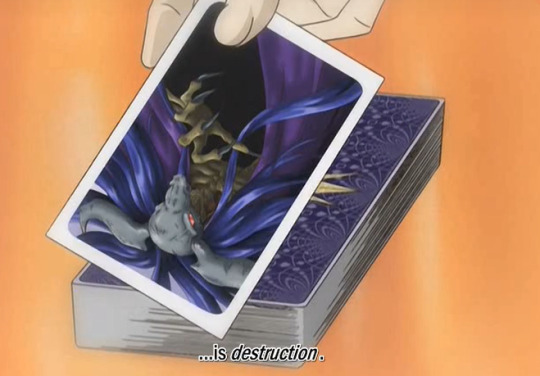
I've foreseen what my future will bring - my fate. THe sign that I've derived is destruction. The upright Devil card. Crime, injustice, temptation, restraint.... It implies them all.
XV - The Devil I am choosing.
Saiou pulls The Devil in a flashback in reference to himself and his future, right after pulling Hierophant in reference to Edo and his role in Saiou's future. We went over the Hierophant above so I'm just going to focus on the Devil.
Saiou's reading of the Devil is pretty much dead on, however, he leaves off a critical part that the man and woman who are chained to the devil in the Rider Waite card have loose chains around their necks that they could take off at any time. The Devil is the card of chaining yourself to your own worst habits.
Do you see how people are chained to this throne? Those are pretty thick chains and look fairly sturdy. Look at their necks, they could slip off at any time but they’re choosing not to. That’s what this is about. Who could create a better hell for us than ourselves? Who knows our weaknesses? Who knows how to make us feel low and dirty and worthless? Who is ready to exploit these
vulnerabilities and hurt us at a moment’s notice?
Yep. Ourselves.
We don’t always chain ourselves without help, peer pressure, poor guidance from parents, but whatever your path is - at some point you have a choice to make. Do I wear this chain or not? Do I drink to excess? Do I hurt someone just because I can?
This card is about chaining yourself to those things that pull you down. Why do we do things to ourselves? When does it become okay to verbally and emotionally abuse ourselves? I think it comes down to two things, fear and doubt. Fear that we’re not as good as everyone else, and the doubt that allows that fear to trickle in.
-Kitchen Table Tarot
It's almost characteristic of Saiou to leave out the part where the Devil is the card of chaining yourself down, because Saiou doesn't believe he has any freedom or choice in choosing his future. He paints himself as the helpless victim of fate, and that makes it easier for the Light of Destruction to control him. As I said before it's left really ambiguous if Saiou is 100% possessed or just corrupted like Yubel, but the Light of Destruction makes the case that on some subconscious level Saiou wants to lash out against the world for excluding him.

Saiou almost exhibits a learned helplessness in regards to his own fate. He doesn't fight back because the light has him totally convinced that he can't fight back. The light also tries to convince Saiou that his destructive impulses are Saiou's own destructive impulses. Unlike Yubel it's less clear - like Yubel is clearly painted as being in control, all of the schemes are Yubel's own designs, Yubel's feelings for Judai are so strong even the Light can't sway them.
Saiou is a mix between being corrupted by teh eldtrich madnezz and just having a powerful dark side ala Dark Marik that takes total control. In favor of the Eldtrich explanation we have the clear lovecraftian inspiration in Saiou, the Light of Destruction, and his deck the Arcana Force. Most particularly the Light is a clear reference to the Color Out of Space.
The color out of space is a short story where a meteorite crashes into a farm owned by Nahum. As a result of the meteor the crops grow large and abundant but are inedible. Thewell water all goes bad. The livestock start to mutate and die off, and their meat is inebile. One of his sons locks himself in the attic and dies, the other vanishes while retrieving water from the contaminated well. The wife then goes to the attic and mutates into a horrible indescribable form.
When Nahum is discovered dying he tells the others that the "color" that arrived on the meteorite is responsible. The color then pours out from the well and makes everything around it go mad, killing the trees, greying organic matter. The "color" itself is an alien entity that corrupts everything around it, much like the Light is described as evil space rays from a White Hole deep into space that corrupts everything it touches. Like the Light makes no sense but it's not supposed to make sense, it's just some weird, unknowable cosmic sense of corruption that twists everything it touches, something with no motivation or sense behind its actions much like alien colors pouring out of a meteorite.
The lovecraftian explanation for Saiou's corruption removes all agency from Saiou, it's not his fault he has just been touched by teh eldtrich lore.
The other explanation is that Devil, that Saiou willingly puts the chain around his neck, that his belief in a fixed future is makes him easy to possess and control. His actions in Season Four support this notion, because Saiou ends up wanting his powers back because of the sense of control that seeing the future was able to give him. The idea that you can control or know the future is a comforting notion to some people, while insecurity and uncertainty over the future is deeply uncomfortable.
There's a quote I love from Choujin X that perfectly describes this very human tendency.
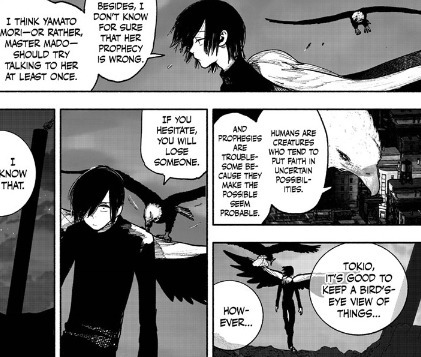
Humans are creatures who tend to put faith in uncertain possibilities, and prophesies are troublesome because they make the possible seem probable.
In other words prophecies provide a false belief of certainty in an otherwise completely random world. Saiou is definitely a victim of this tendency because even his good half so to speak acts completely helpless in the face of the Light instead of fighting back, and it takes Edo's encouragement in order to do so. Edo goes from saying that he wants to hold an umbrella over Saiou's head, to realizing simply standing there in the rain together underneath an umbrella isn't enough, they need to keep walking forward too.
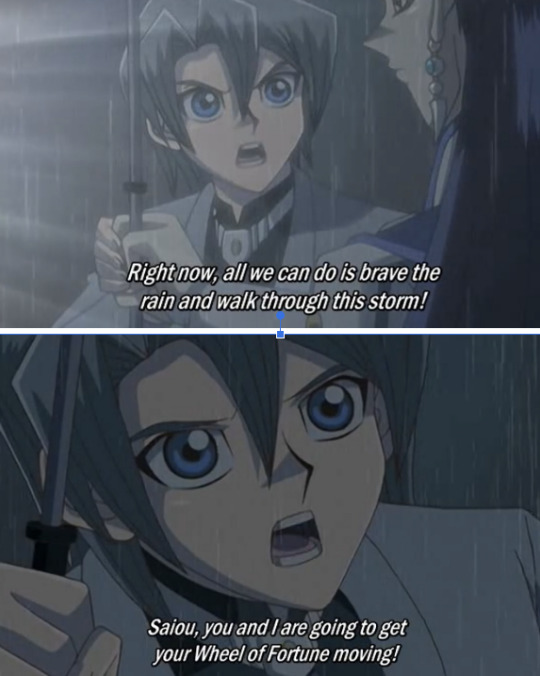
In other words it's Saiou himself who puts on the shackles, and it's Saiou himself with Judai and Edo's help who has to throw them off. When Saiou is liberated from possession he also loses his ability to see the future, the very thing that made him destiny's puppet in the first place.
The World is also referenced by the episode title. It's Saiou's ace Arcana Force card which he uses against Edo, (though his true ace is the Light Ruler which he wins the duel with).
XXI - The World I am Transforming
The world is the last step of the fool's journey. It's the card of self-realization and self-fulfillment. The world is typically depicted a woman standing in the cnter of a wreath, surrounded with four images four astrological signs. The Lion is Leo, the Bull is Taurus, the cherub is Aquarius, and the Eagle is scoprio. These four signs also represent the four elements of aclehym, an fire sign, earth sign, air sign and water sign respectively.
The world represents the final step of the fool's journey, a journey of self-discovery.
"I found this quote about the World and it always strikes me as perfect: "One does not conquer the world, one discovers it."
Kitchen Table Tarot
It also symbolizes the final step of alchemy, which is to create gold, or in a Jungian sense to finish individuation.
What can we say of an understanding, a freedom and rapture beyond words? The unconscious known consciously, the outer-self unified with the forces of life, knowledge that is not knowledge at all but a constant ecstatic dance of being - they are all true and yet not true. The purpose of this card can be described as that of uniting ourslves with all thos things seen in trump 10 as the external vision, that is, fate, the workings of life, the element of existence. When the unity is acheived the symbols vanish, dissolved into a dancing spirit.
Seventy-Eight Degrees of Wisdom: A book of Tarot
The most important aspect of The World in this case is spiritual unity. Yu-Gi-Oh and its various spinoffs is after all, the friendship show about friendship. Though I'd argue that Yu-Gi-Oh surpasses the typical "solve everything with nakama speeches" of the Shonen Genre by showing that showing friendships can be conflict ridden, even trying at times, especially in Season 3 which shows the difficulty of trying to save a friend when they are in a self-destructive spiral. The difference between Yu-Gi-Oh! and other shonen manga is that it's themes of friendship are more solid because these friendships are continually tested and tried.
Friendship in this case also means an alchemical union, alchemy is symbolic of the bonds between people. In order to make a bond stronger it has to be broken and reforged again the same way that alchemy's chemical reactions melt down metals and reforge them as something purer.
The unity aspect of the world shows not only what Edo needs to do to reach Saiou, (The holding out the Umbrella under the rain metaphor) but also it foreshadows the union between Judai and Yubel in season 3. In both cases the solution is a union, and in both cases it's not an easy union because Saiou is in conflict with Edo, and Yubel is in conflict with Judai.

Afterwards Saiou has to reform his sense of self without his powers (something he struggles to do in season 4) and Juadi / Yubel has to reform themselves (once again his entire character arc in Season 4) after all the changes they've endured. The World is a card of transformation and once the transformation is complete there's nothing to do but go out into the world and face it, just like when children are finished growing into adults the final test is for them to leave their parents home and embark on a journey out into the world.
There we go every tarot reference in Yu Gi Oh - oh wait I forgot one. One last Tarot card for the road.
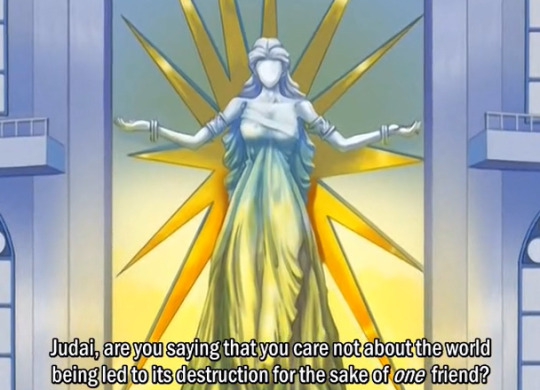
XI - The Justice I am balancing
Judai: I am going to save Ed - and you know that goes for the lives of everyone in the world, too!
Saiou: Oh? Playing superhero are we?
In this conversation Saiou calls out Judai's decision to gamble with the fate of everyone else on earth, by trying to save Edo instead of just throwing the key into the ocean so Saiou can never get access to the satellite. It's a very selfish, and very Judai-like decision.
I'd say that this is again setup for Season 3 which goes more in-depth into Judai's tendency to make decisions like these, only looking at saving the person in front of him instead of the big picture. From a simple utilitarian perspective you should sacrifice Edo to save the rest of the humans on earth, but life is more complex than just the trolley problem.
There are some times when Judai's desire to save one person over the group is a bad thing, such as when his fixation on saving Johan leads to a situation where the rest of his friends get killed because of his self-centered thinking.
There are times when the characters admit they aren't trying to be a hero just save a friend, Jim Crocodile Cook and August O'Brien save Judai not because it's the heroic thing to do but because they want to help their friend - it's something they admit is selfish on their part. A lot of Season 3 is showing that heroes aren't just slaves to justice and right and wrong and they can often make selfish decisions, but also putting one person over the many isn't necessarily a bad thing.
The utilitarian thing to do would be to kill Saiou, to kill supreme king Judai and then later kill Yubel for the sake of the world, but is that really going to be the solution in the friendship anime about friendship? Especially in an anime that borrows so heavily from Jungian themes, in Jung the solution is not to kill your shadow but unite with it.
Invoking the Justice in this Situation basically symbolizes this conflict between saving your friends and saving the world. As I said Yu Gi Oh Gx doesn't really give a definite answer on the "Needs of the Few vs. the Needs of the Many" debate it just portrays it as something complciated.
I always thought that the Justice card was male, but then I did some research and found that it's based on Athena. If you look at the card, there is no water. This is a bit unusual for tarot cards, particularly in the major arcana. No water? No emotion. This card is about being critical and impartial. There is no room for empathy.
Everything in this card is even. The roes are symmetrical, the pillars are parallel, and the sword held straight up balance the scales hanging straight down. She (justice) will start moving as soon as she makes her decision and will carry it out. Justice is about action.
Also don't forget that she's holding a sword. The swords suit is about intellect. If you can imagine that Justice is holding the Ace of Swords, you can get an idea of the pragmatism that lives in this card. When this comes up in a reading you have to take all of your emotions out of the decisions you need to make.
Justice is primarily about two things, it's about removing emotion from the equation, and also about balance. Once again I think this is foreshadowing a later conflict, because for the first two seasons Judai makes all of his decisions with his emotions and that works out for him for the most part, until it doesn't.
Judai deciding to surrender the key to save Edo is a purely emotional decision on his part, he's not really weighing the life of Edo against the world he just wants to save Edo.
Judai's decision making is pretty biased but it's not entirely wrong either, like what's the point of calling yourself a hero if you don't even try to make an effort to save somebody in trouble right in front of you.
He's also following the concept of alchemy, as above, so below. That which is above is like to that which is below, and that which is below is like that which is above.
In other words decisions in the microcosmos (the world of humans) affect decisions in the macrocosmos (the heavens). This alchemical premise that the decisions you make in your everyday life ripples out to affect the world, because everything is connected, is woven into the show itself. Neos literally tells Judai that his duel against Saiou on earth, will also ripple out and effect the cosmos.
Judai's reasoning isn't entirely selfish, why can't he try to take a third option and save both Edo and the World?
Which is I think why we're invoking the justice here, Judai does in fact need to learn to remove his emotions and think pragmatically, he spends basically all of season 3 and 4 doing just that - but too much cold reason is just tipping the scales in the other direction. There's no such thing as a completely objective person, in the end Judai is a human being making a decision.
Jim, and later August's decision to save Judai when he becomes the Supreme King is a selfish one because they're putting Judai above the world, but they're also teenagers, and they admit that they're not being heroes of justice they're just kids who want to save their friend.
So the Justice here indicates the very balanced take on justice and heroism that the show gives us. People can't completely embody justice because they are biased unlike lady justice herself, however you can't compeletely decide things based on your emotions either because that will blind you to the consequences of your actions. Judai's selfish desire to save Johan and play hero in Season 3 hurts his friends because he only thinks of his own feelings, not the bigger picture or the feelings of his friends.
Honestly this whole concept of love vs. justice that GX is trying to balance reminds me of an anecdote I heard in church from my childhood where the priest was ruminating on god and faith and he basically said, that you can't have justice without love, because without love to guide it Justice becomes cold and unfeeling and basically becomes just about punishment.
That seems to me what GX is trying to tell us with Saiou, and then later Supreme King Haou, and Yubel's arcs. That yes all three of them did bad things, things that hurt other people. Justice demands that they be stopped, and that they face some sort of consequences for their actions. However, justice without any sort of love is just punishment.
Maybe Saiou, Judai and Yubel deserve punishment for their actions, they hurt a lot of people, but they themselves were hurt too. Killing them for the greater good is certainly an option, and maybe that is justice but there's no love in the action.
You could say that Yubel deserves to die for the sins they committed, but every soul lost that could have been saved is still a life lost.
Judai could have killed Saiou for the sake of the world, but because he saved Saiou, Edo spends the next two seasons selflessly helping Judai in thanks for Judai deciding to help his friend.
Jim and O'Brien could have killed Supreme King Judai for the greater good, but the decision to save Judai later saves Yubel as well because if Judai had died do you think anyone would have been left to stop Yubel?
Saving Yubel is also a part of Judai's own atonement arc because from Season 4 on, both him and Yubel are able to work together to help bring balance between humans and duel spirits.
Therefore the solution comes in finding the balance between love and justice.
In the friendship anime about friendship, helping your friends is a good thing and abandoning your friends is a bad thing.
In other words, I could have summarized this entire overly long post in one sentence. I wrote way too many words about the Card Games Anime TM but congratulations to all of you who read until the end - here's a cookie!
#Yu-Gi-Oh Gx#yu gi oh gx#yugioh#yugioh gx#judai yuki#saiou takuma#edo phoenix#ed phoenix#yu gi oh gx meta#Yu-Gi-Oh Gx meta#gx meta#jaden yuki#yubel#jun manjoume#asuka tenjoin#chazz princeton#alexis rhodes#the fool's journey#tarot#ygo#ygo gx#ygx meta#ygo meta
16 notes
·
View notes
Text
Moominpappa's Memoirs vs Adventures of Moominpappa part 1
In which I compare the episode to its source material.
Warning: this essay is a 13.3k word long deranged rambling written by someone who is obsessed with Moominpappa's Memoirs and its characters. Continue at your own discretion.
Background and clarification
The Exploits of Moominpappa was a book written and illustrated by Tove Jansson and originally published in Swedish in 1950. It is the 4th story in the Moomin book series and follows Moominpappa, Moomintroll's father, as he writes his Memoir which has been mentioned in the past 2 books and reads it to the child main characters. The Memoir itself recounts his life story from childhood, his adventures with the other children's parents and up to his rescue and first meeting of his wife, Moominmamma.
Later in 1968, Tove made a revised version titled "Moominpappa's Memoirs" which followed the same outline but with changed scenes and extended sequences, adding much more compelling characterization and character-driven moments to move the story along.
Moominpappa's Memoirs was then adapted in May to August of 1991 for the hit Moomin adaptation series, Moomin (1990), as a series of 3 episodes interspersed between other episodes under the encompassing title "Adventures of Moominpappa".
Despite what Wikipedia tells you, it is not in fact an adaptation of the original The Exploits of Moominpappa (although the title might mislead you to believe that) as much of the content in this trilogy adaptation takes from Moominpappa's Memoirs, such as the frozen sea scene or the Joxter's introduction. However, much of its content has been cut, spliced or changed altogether to fit the 60 minute runtime allowed for these three 20 minute episodes.
What this post aims to be is a critical look at these episodes as pieces of television entertainment and as adaptations of the book, starting with the first part.
For clarity, I did not grow up on this show and this show's writing has never been perfect to begin with, even when we take adaptation out of the equation. I don't dislike the show as a whole by any means, but I can tell very clearly that it has managed to dodge criticism for so long (well, at least for fans who aren't personally connected to the previous incarnations of the franchise and therefore their major criticism would've been "this isn't like the thing that came before!") because of the sheer Vibes that the show exudes and its weirdness in its substance was only seen as amusing rather than a problem or as the same thing as the weirdness that's inherent to the whole franchise (which is a subject I may touch upon in a later date.)
The long and short of it is; it's not perfect in either avenue of how you view these episodes. However, I do not fault anyone for liking any of them and much of this is my own opinion and simply observations on how well it's handled as an adaptation. I'm doing this out of a love and passion for this franchise and this isn't a niche that's been covered before as far as I'm aware (also, Tumblr user @helshdy has requested me to do this and that's my excuse for getting me going on this)
And for clarity, the adaptation has changed the names of the characters in the English dub for some strange reason, and here's the list (book names - show names):
Hodgkins - Samuel Fredriksson (fun fact, it seems to my knowledge that the English translation of the book is the only one that doesn't use a variation of the original Fredriksson. The reason is totally unknown to me. Also, he never had a first name in any previous material he appears in, so I don't know where in Moominland they came up with adding Samuel there)
The Muddler - Fuddler (Fuddler is actually the name of his child who is not Sniff in the comics)
The Mymble - Mumaline (is that how it's supposed to be spelled?)
The Mymble's Daughter - Mumaline's Daughter
The Fuzzy - Muddle (yes, without the r)
Edward - Eduardo
For the sake of simplicity I'll be using the book names, except I'll be abbreviating the Mymble's Daughter to MD and refer to the King/Autocrat as King Jones like in The Exploits of Moominpappa (because I am majorly upset at Tove removed his name in Memoirs). And I'll be referring to young Moominpappa as Moomin while his son will be referred to as Moomintroll.
In this post, I'll only be covering the first episode and do the other 2 episodes in seperate posts, as well as an extra post evaluating this trilogy as a whole and diagnosing what it did to the story to end up the way it did.
So with all that out of the way, let's begin with the
Recap
The episode starts with Moominmamma preparing something in the kitchen and going upstairs, Moominpappa is sick in bed and Moominmamma gives him a warm glass of milk and onion juice. Moominpappa muses about how if he was gone then Moomintroll and Moominmamma wouldn't know about his childhood, Moominmamma asks about the memoir he's been writing throughout the show and he says it only starts from after he saved Moominmamma. Moominmamma is confused but flattered that the memoirs start with the beginning of their relationship, even if she thinks they usually start at the beginning of one's life. Moominpappa says rather vaguely that he has his reasons for not starting from the beginning (we'll get to this in the review portion).
We then get treated to Little My gathering Sniff and Snufkin to meet up with Moominpappa and using lies to make sure they don't skip out on listening to Moominpappa telling everyone about his Epic Backstory, and then when after the misunderstanding is cleared up, Moominpappa lays the foundation of what he's going to tell them, mostly about the people who "kinda looked and sounded like them".
Finally, Moominpappa recounts the dreary August where he was found in a shopping bag at the doorstep of an old orphanage run by a principal who was very reminiscent of Mrs. Fillyjonk. We see a montage of how his childhood went; he gets marked in marker with the number 13, he wets the bed and gets washed in the sink, he fails to bow down with his tail in a 45 degree angle, all the while he questions everything and his principal complains about him being more troublesome than the rest.
Then, one late winter, he decides to head to the forbidden seaside on a whim and skates on the ice. He admires himself in the lake reflection and describes himself fondly, his only complaint being his legs being "too short for perfection", although he hopes they might grow longer if he skates and walks more. He continues on skating and breaks the ice, causing him to fall into the water and narrowly escaping with his life. This, Moominpappa considers, is his first adventure, and the thrill is much too enticing to let it be his last. That night, he decides to escape the orphanage through the window while everyone is asleep, all the while a voice over narrates the letter he left for his principal about his departure and that she needn't fret.
With a side bag worn, he's off to the races in his grand escape! But in his way is an increasingly terrifying unknown forest which he imagines is out to get him as he runs with all the speed his small legs could carry him, afterwards, in the windy night, he cries himself to sleep in a hollow log.
He wakes up to a bright and beautiful morning where he meets with a brook and spots a strange spinning wheel turning in it, he muses about it and then a man in a purple onesie appears in front of him explaining that it's an experiment for his ship that'll launch that day. The two become fast friends and Moomin learns that the man's name is Samuel Fredriksson (but we'll call him Hodgkins) and he takes him to the boat.
Hodgkins calls for his nephew, Fuddler (Muddler), as he seems nowhere to be seen, but then he pops out of his giant coffee tin with a can of red paint and apologises. Hodgkins introduces him to Moomin and tells him to hurry up with the painting, to which Muddler ensures that he'll do it as fast as possible.
Hodgkins and Moomin enter the pilot-house where we are introduced to Joxter sleeping on the couch. Hodgkins gets upset and asks if he read the "No Admittance" sign on the door (there's literally no sign, visually?) and says it means he shouldn't go in, Joxter lifts up his hat and proclaims that he doesn't understand signs (cue audience cheering).
The 3 of them step on the deck and Moomin asks what the ship's name is, Hodgkins says that of the names he's thought of, he named it the Ocean Orchestra (the Oshun Oxtra) since it sounded poetic. Moomin asks how they'll set sail and Muddler realises they haven't thought about that, Hodgkins reassures everyone and says that they'll employ the help of Eduardo (Edward) the Booble. Hodgkins explains who and what Edward is and Moomin asks if he's dangerous, Hodgkins says he's not really but if you're not careful he can step on you, but don't worry! He always pays for the funeral!
Hodgkins proceeds to yell out into the distance calling for Edward and asks him to bathe in the river instead of sea since it's so nice that day. Edward then rises up from out of the forest in slow motion all Kaiju-style and Hodgkins and Moomin run back to the boat, Edward does a 6/10 belly flop into the river causing the water levels to rise. Moomin and Hodgkins make it to the pilot-house where Joxter is sleeping again, Hodgkins takes the wheel and yells out vaguely nautical sentences to nobody in particular and the boat finally takes off. But oh no! Edward is blocking the way! Moomin is worried they might crash into him, but also asks what's behind Edward, Hodgkins does this monologue about the sea and it being adventurous and Moomin is very dreamy about finally getting adventures at last. Hodgkins gets out of the pilot-house to yell at Edward to get out of the way, and yelling about how he's been preparing for this for years finally convinces the Booble to get out of the way.
Just as Hodgkins was saying this would be classified as a historical moment, Muddler yells out from his floating tin and Joxter suddenly wakes up, commenting on how it sounds like he might be in trouble. The crew runs to the back of the boat to see what's up, Hodgkins seems annoyed as if this is Muddler's personal doing but Joxter reassures Muddler that they'll get him out of there, Muddler gets upset about the crew being mean and leaving him behind but then Hodgkins through him a lasso which knocks him over.
Muddler ties the rope to the key-type can opener and they sail past Edward, which causes a bit of a turbulence and flooding but ultimately they cheer in victory of a successful maiden voyage.
Then it's sunset, the crew stop at some cliffs and find the Groke chasing an unknown person through them. Moomin asks about what happens if the Groke touches them and Hodgkins explains that the Groke doesn't really do anything and that she's lonely, but if she gets too close the person would freeze. Joxter also concurs that it's too late for them to do anything. Moomin isn't deterred by this and rushes to rescue the mysterious person being chased by the Groke by swimming down to the cliff with Muddler's tin as a catcher, all the while he and Hodgkins argue about this decision. As it turns out the mysterious person was his Orphanage Principal (although Moomin doesn't realise that until later) and she jumps into the tin, after which they swim back to safety with the Groke looking on and the crew cheering.
We then get Moominpappa in the present talking about how this is the third adventure he's ever had and the first of many rescues. Moomintroll gets really excited and inspired to become an adventurer like his father and Little My asks who Moominpappa saved and what happens next. Moominpappa tries being cheeky by saving the continuation for another time but Snorkmaiden insists on telling them who it was at least. He finally tells them that it was the principal of the orphanage, as she was looking for him after he made his escape.
We then cut back to his story after Moomin got the tin on deck. Moomin expresses displeasure at his rescue being that of his Orphanage Principal and says he wouldn't have saved her had he known it was her, Hodgkins assures him that what he did was brave. The Principal then becomes a demanding presence, making Moomin and Hodgkins instinctively straighten their posture and asking Moomin who everyone is, then declaring that she'll take them under her wing and teach them how to behave.
Joxter excuses himself to go below deck and Muddler follows him after, Hodgkins and Moomin also run elsewhere while she's distracted and she continues yelling demands at them.
We're back once more to Moominpappa and the family, Snorkmaiden and Moomintroll amusedly comment on the unfortunate situation, Moominpappa laments that he might've saved her anyway if he had known and that you can't just win, can you? Moominmamma expresses terrible pity for Moominpappa's childhood but he reassures her that it wasn't that bad. He then continues saying that the next part of his story is really exciting but they must wait until he recovers from his illness. The narrator then tells us to tune in for the next part where we find out what happens to the Orphanage Principal after… (*checks episode list*) 3 other unrelated episodes.
The end.
Episode review
While it is a very watchable and enjoyable episode of a kid's show there are a lot of glaring issues with pacing and writing efficiency.
The introduction does a good job at introducing our original main cast but I am very baffled at the convoluted way they decided to reconcile the memoir Moominpappa has been writing throughout the series and the backstory he's telling the kids in these series of episodes by having the show's memoir be about everything that came after his meeting with Moominmamma, in fact Moominmamma herself questions the issue because even if it's not really a full autobiography the starting place lacks a lot of important context that lead up to it, and the writers had the gall to make Moominpappa handwave this question with a vague answer that doesn't excuse anything.
A much more efficient writer would've just had him ask Moominmamma to bring his yet unfinished memoir to read to the kids after his musing and used the time from this conversation for something else but whatever that's not the biggest issue.
The biggest issue I have with the episode's writing efficiency is the very unnecessary break near the end of the episode where the kids ask who the person Moominpappa saved was, because we quite literally see the Principal hopping into the tin? She quite literally comes from the shadows and we see her very clearly which renders the subsequent scene utterly pointless? In an in-universe perspective, yeah sure it makes sense for the kids to impatiently ask who it was but we get the confirmation right after! This is a show made for an audience who can see the flashback taking place and doing something like this is redundant and it's wasted time that could've been used to, I don't know, flesh out the story's characters more? Add a bit more substance to everything between the action?
Speaking of that, there is a noticeable amount of emphasis on the action with little to do with characterization here (which is an issue throughout the trilogy but we'll get to it when we get to it). There are about 3 whole action scenes in this episode: the ice break, the escape and the launching ceremony, the latter two of which kind of overstay their welcome a few moments too long (especially the ceremony).
The ice break was fine, it accomplished itself as the Call To Adventure in Moomin's Hero's Journey and that's all it really needed to be, it's a fun and intense enough scene with good character animation on top of that.
The escape from the orphanage was a bit too unnecessarily intense to the point where it didn't well fit with the tone of the rest of the story and could've used some better editing, especially with the parts surrounding the bit where he cries inside the hollow log; it would've been preferable if we actually saw him crawl inside it and then crawl out of it in the morning, I think it would've improved the flow of the scene.
It was an odd choice to give Edward a full Kaiju moment with the slow motion and everything and even have him block the path just to extend the scene after they got Muddler tagged along, and having the boat be flooded and everything, all it really does accomplish is adding a bit more to Hodgkins' character with his dialog which is kind of meh? And it's not at all characterization that gets used later on in the episode or the whole trilogy so what the scene accomplishes is coolness for the sake of cool at best (which only applies to the first half of the scene honestly) and runtime filler at worst.
You could argue that the emphasis on action is a product of Moominpappa's way of telling his story in-universe, and I would say I completely understand that reasoning, but there's not much in the way of acknowledging that this style of storytelling is Moominpappa's doing and is an extension of the story's nature as an in-universe story, and the episode fails to properly establish that Moominpappa is prone to embellishments or wanting to make himself seem cooler than he is (this issue is somewhat rectified in the beginning of part 2 but this is what I'm talking about when it comes to efficient storytelling). So in the end it makes it feel like this is the writers simply doing their job rather than putting their writing through the filter of Moominpappa's character, which leads me to the point of characterization.
The characterization is… okay and it does a half-decent job, but it's definitely very boring in the way that it makes Moomin too similar to Moomintroll and it makes Hodgkins a little too indistinct on whether he's nice or not. Joxter and Muddler could've used some work but they aren't majorly important characters in this first part and it does establish their characters and quirks pretty fine for the little screen time they have. Edward is… a sea monster with no thoughts behind those eyes and listens to Hodgkins like a dog it seems, he's more like a plot device than anything.
Funnily enough it's the Principal who has the best characterization out of everyone, definitely not likeable by any means, but it's that obvious unlikeability and consistent, obvious character motivation that makes her the most well-established character at least in this episode. I just… really wish she wasn't treated so cruelly by the other characters honestly, like I get it, she's annoying and authoritative and didn't treat Moomin well but nobody is holding back any punches with her, who is, mind you, the only major female character in the story so far. To make Moomin say despairingly how he wouldn't have saved her if he knew it was her? To have the kids talk about it like it was a hilarious misfortune to save her life from the Groke? It's a bit… mean-spirited, far more than usual for this show.
But I'll talk about the characters more during the adaptation section of this post.
Overall I'll say that the episode is decent but doesn't have truly interesting characters that would've really elevated the episode for me.
Adaptation review
Okay so this is where my teeth are going to show because it is very, very much NOT a good adaptation.
Part 1 is an adaptation of the prologue, chapter 1, chapter 2 and the first third of chapter 3. The thing is that it skips over the whole preface Moominpappa wrote but that's whatever, all the preface accomplishes is some humorous establishment that Moominpappa is most certainly not a reliable narrator and that he hopes to be viewed as important by those who read it, it's difficult and not necessary to adapt in animated form with the format they decided to use. The rest, however? They've skipped over quite a bit and made a complete overhaul to the characterization and tone of these chapters. Which is understandable for a 20 minute episode and admittedly even just one chapter is very long even without the tangents Moominpappa goes into, buuut…
PROLOGUE (AND PREFACE)
The way the episode's version of the prologue handled Moominpappa's character is already a big indicator of this. In the book, Moominpappa feels the absolute indignance of being sick for the first time in his life and getting a very, very bad experience with the cold on top of that. The cold made him miserable and annoyed, he refused to consume anything medicinal from Moominmamma, he couldn't sleep, he had a great amount of tissues under his hammock, he had an unbearably sore throat that rendered his speech unintelligible when he asked Sniff to get the meerschaum tram for him. His family and adoptive children felt pity and tried to accommodate him as they could until he fell asleep, terribly vexed by all this.
Moominpappa awoke with a throat that felt a little better and spoke to Moominmamma about the significance of the aforementioned tram to which she doesn't really understand, which upsets Moominpappa immensely and he is resentful that she and their son wouldn't know about the great history he went through had he died from the cold. Moominmamma suggests after some deliberation, as she always had, that perhaps he should finally take the time to write and read his memoirs using an old notebook she found while cleaning the attic, Moominpappa gradually agrees to this and declares that he won't read a word of it to the others until he gets a whole chapter ready, though, she'll be the only test audience for the chapter until he moves onto reading to the children.
One thing to keep in mind for book Moominpappa (and by extension, his younger self) is that he is very… egotistical, which is a facet of his character I would love to go into excruciating detail about once I finish this series of essays but let's just say he's egotistical and over-dramatic and just LOVES writing about himself in the most melodramatic and egomaniacal way and the adaptation tries very, very hard to either downplay it or remove it entirely even though it is an essential part of his character that separates him from the likes of Moomintroll.
Moominpappa's vexation with his illness is one example, it's his first experience with the common cold and this is the situation we get introduced with to establish him and his surrounding characters; this Moominpappa is one that is stubborn, melodramatic and miserable over the helpless and undignified position he's suddenly placed in. This whole sequence wasn't a part of The Exploits of Moominpappa, either, it is added here with the purpose of showing us the kind of person we're reading this perspective from and the context he wrote this story in. It establishes his dynamic with the characters that surround him and even establishes those characters themselves in the most essential way there can be.
The scene in the episode does not establish any of Moominpappa's melodramatic and sour attitude from being undignified, it doesn't even establish him as being prone to being a generally unreliable narrator like in the preface, or that he really likes to talk about himself (he doesn't take the time to talk at length about himself in a self-aggrandizing way or even anything seemingly superfluous AT ALL within the story even though that is the whole premise of why he's writing his damned Memoirs and is one of the foundations of his character that affects his interactions with the other characters within the book). It establishes the audience characters very well, even more so than the book did, but it doesn't establish Moominpappa himself very well, and he's meant to be the point-of-view character and the most important one in this series of episodes.
It's almost fascinating how they dared to tone down such a straightforward character like Moominpappa even when they didn't seem to have an issue with the aforementioned aspects of Moominpappa in other episodes.
Moominpappa's Memoirs is, in essence, a parody of how self-important men write about themselves and the people around them in their own memoirs, this parody circles all the way back to sincerity by showing us genuine vulnerability, emotion and the outside process and reaction to Moominpappa's story. By not establishing just how self-important but also sincere Moominpappa is you're missing out on half of what the book is set out to do.
CHAPTER 1
The chapter 1-3 sections of the episode is what you get when you skim over the personal expression in narration to get to the barebones plot, and even the barebones plot gets smushed in the middle to save time. The adaptation as a whole really would have benefitted from the advantage given by the inclusion of the narration gimmick and let Moominpappa tell the audience about his thoughts and how he felt in the situations we're presented with. Show don't tell may be a rule of thumb in visual media but the book and story's whole personality hinges on expositing Moominpappa's thoughts on most, if not every matter he tells us about and even talking directly to his audience, to remove that would be to remove what made the book unique from the others in the series with its first person perspective. This is a story relaid to us by a character, it should've been treated as such. But as we're going to see, the adaptation does not concern itself with the emotional narrative of the book.
Chapter 1 gets into the nitty gritty of his life in the Orphanage, or in actuality, the Moomin Foundling Home.
Right off the bat there's a minor issue here that could be used as an example of how the adaptation prioritised the overall "Adventure" over the purpose of each detail and how it contributes to the themes of the story.
In the episode, the Orphanage is a diverse one that is run by a Fillyjonk. In the book, the Foundling Home is one made to house specifically Moomin-children and is run by a Hemulen.
Now, from a character design perspective I can kinda get it, I would've liked to see how creative they could've gotten with designing the 12 other Moomins but alright, fine. But from a thematic perspective it cements Moomin (number 13) as a strange individual even within his own species rather than being inherently strange for being the only Moomin. Moominpappa goes on and on about how special he is juxtaposed to a regular Moomin, how talented he is, how imaginative and curious he is compared to his vapid peers who just obey the Principal and don't talk to him. He's special because he specifically was born special, not because he was born a Moomin, and that is a difference that is greatly cemented within the book that it's practically part of his personal definition of himself, and that difference gets lost in translation when you make him the only Moomin in that orphanage.
The Principal being a Hemulen was also a pretty important point in the book. In the book series as a whole Hemulens generally represented authority or even just a parody of Adults, they're the antithesis of Moominpappa's imaginative spirit and he dunks on them in many ways throughout the whole book.
Hemulens are antagonists who want to take away some aspect of his life that he cherishes, people don't like to talk about Hemulens, Hemulens have no taste in fashion, Hemulens love duty and unfulfilling routines, Hemulens love sticking their noses in business that doesn't pertain to them, Hemulens are annoying and bossy, Hemulen orphans are seldom found and therefore a foundling home for them would've been useless, everyone born 20 minutes after Moomin would've been in a Hemulic Voluntary Brass Band (so be very careful of when your children will be born and plan/calculate accordingly!)
Hemulens have always been the subject of judgement and misfortune throughout the book series despite not doing anything morally reprehensible and still nowhere is the judgement more intense than in a book where an in-universe character gets to tell his story.
The Principal being a Fillyjonk in this adaptation does little more than to tie Mrs. Fillyjonk in all of this somehow (although I will admit her design is very pretty *cough*) and make all the criticism into mean-spirited bullying that's almost unfairly concentrated on her. I am aware that Moominpappa implied he switched the species of at least one Fillyjonk to a Hemulen character in his preface;
“In consideration of the feelings of many persons still alive, I have sometimes exchanged Fillyjonks for Hemulens or Gaffsies for hedgehogs, and so forth, but the talented reader will have no difficulties in understanding what was actually what.”
Alas, it's not a particularly convincing argument in favour of changing her species, especially given the context of the book.
The 90s series very notably tends to disregard the social commentary posited by the source material and in effect it either perpetuates the things the source material critiques/avoids (the sexism) or nullifies the original message by either not following through on the message of the story or contradicting it entirely (most of the adaptation episodes, really). There seems to be a fundamental misunderstanding of why the story is written that way, or they do in fact understand but deliberately try to circumvent addressing the themes of the story in the name of making them uncontroversial and removing them from modernity. But in doing so they don't replace it with anything that's of substance, they don't let the characters be themselves with their original warts and oddities either.
For the sake of brevity I'll save most of the minutiae of Moomin's characterization within the memoir for a later post, but I'll summarise that in the book he is characterised as a pitiable egomaniac after an early childhood of asking questions about the fundamentals of reality and being met with hostility or avoidance by everyone around him:
“So passed my early childhood in quiet and constant wonderment. I was permanently astonished, always repeating my questions of "What, when?" and "Who, how?" The Hemulen and her obedient foundlings avoided me as best they could; the word "why" seemed to make them uneasy.”
(...)
“But by and by a change came: I started to muse about the shape of my nose. I put my trivial surroundings aside and mused more and more about myself, and I found this to be a bewitching occupation. I stopped asking and longed instead to speak of my thoughts and feelings. Alas, there was no one besides myself who found me interesting.”
Much of the first half of the chapter is exercising what these 2 paragraphs summarise. The Principal seems more preoccupied with order and cleanliness than actually raising these children, she says dreams are trash right to Moomin's face.
However, the origin of why Moomin describes himself as talented rather than strange or some other word is because of her and her interest in astrology.
“However, the Hemulen who had built the Foundling Home was interested in astrology (somewhat), and wisely enough she observed the dominant stars at the time of my coming into the world. They indicated the birth of a very unusual and talented Moomin, and the Hemulen accordingly worried about the trouble awaiting her (...)”
Assuming that the Principal told him of this when he had the capacity for memory formed (or that any of this is true), she is the cause of why Moomin seems to act the way he did (presumptuous genetic disposition and inherent neurodivergency aside)
Moominpappa has latched onto this adjective ("talented") as if it were a lifesaver. He defines himself so immensely from this one word that it makes a hypothetical visit to a therapist a rather concerning prospect. But, again, I won't go too far into detail about it.
And here we come to face the original Call To Adventure. The early spring (yes, spring, not late winter like in the episode) in which he almost fell into the frozen sea. This is the one scene I wanted to talk about greatly, since it is the perfect microcosm of the difference between 90s Moomin and Book Moomin.
Moominpappa talks about this visit as a mere, vague whim. It was the first time he saw such a bright and full reflection of himself. Before, he had only looked at himself in the hall mirror back in the Foundling Home, and he'd look into his own eyes and wail sad phrases describing his misery until he felt better, but now… now there's a whole new light to see himself in, and he sees himself as a creature to compliment.
Here's the major difference between the source material and adaptation;
You may recall that in the episode his only complaint were his legs and he hopes to himself optimistically that they'd grow longer if he worked towards it. In the book, on the other hand…
“The paws were really my only disappointment: they had a look of helplessness and childishness that bewildered me.
"However," I thought, "perhaps it will pass with time. Doubtless my strength is in my head. Whatever I do, I will never bore people. I'll never give them time to look as far down as my paws." ”
He was offended by the mark of helplessness and indignity, just like in the prologue. He thinks about compensating, to make himself so grand and exciting that people won't have the time to notice his faults.
He won't give them the time. Not that they wouldn't dare, not that they'd never notice and not even that they'd ignore those faults, he'd be the one with agency to strip them of that possibility. And I believe that's very telling.
He lays down to get a better look at himself and sees not his reflection but the deep, dark vastness of the sea. He was initially giddy but soon falls into terror as he contemplates the depth of the waters he's sitting over until he feels upset. He stands back up and stomps on the ice to see if it would hold, he goes further out and stomps on the ice again, it breaks.
One of the major compromises of the adaptation that does an injustice to the book is that we don't get to take a proper look at his thought process. What was a brief and imaginative introspection in his supposed final moments (that really ought to cause some alarm about his priorities) that ends anticlimactically turns into an action scene.
“Perhaps one of the threatening shadows would devour me! It was not impossible that he would take one of my ears along to his children and tell them, "Now, eat up before it goes cold! This is genuine Moomin and not to be had every day!" Or I would float ashore with a tragical clump of seaweed behind one ear, and the Hemulen would weep regretfully and tell everyone she knew, "Oh, he was such a singular Moomin! What a pity I didn't understand it in time . . ."
I was just starting on my funeral when I felt something very cautiously nipping my tail.”
Moominpappa calls these thoughts "enticing dreams", which- erm, okay sir (the full implications of this is another pin I'll address in a future post). But anyway this establishes very clearly what Moomin's first thoughts will be when faced with certain situations, and that is the prospect of being given attention and acknowledgement, to be considered special and worth people's time. That even in the face of potential death he finds some way for his death to Mean Something for him and those who stumble upon him.
He also wants his Principal to be Wrong about him and realise that, and this will come into play in chapter 3.
The adaptation really fails to establish his priorities and desires, it even contradicts them outright later in the episode, but we'll get to that.
After crawling back on shore Moomin comes to the epiphany of wanting to experience the real world and taking his fate into his own paws, he can't possibly stay in the same living situation after such a matter.
He was cold all day after the incident but nobody asked why, which cemented his decision as nobody seemed to care about his well being in the slightest. He tore his bed sheets to use as a rope and his peers looked on without a word, which hurt his feelings, and finally in the evening he wrote his farewell letter and made his escape.
The escape itself had a lot of emphasis on how terrified he was, the bushes and stones turned into formless monsters because of his terror and imagination but it wasn't quite as sensational or emphasised as the episode portrays it. Moominpappa just describes how… scared and in need of comfort he felt, that even the Principal would've given him some comfort, but he just couldn't retreat after such an imposing letter announcing his leave.
Then we get our first intermission with Moominpappa in the process of writing these events, I will say that I won't be describing these mid-chapter intermissions in this essay unless they mention anything particularly important to the plot as they aren't necessary for this analysis.
And then sunrise came and it was the most glorious relief, it was his own private morning, he claims. And he tore the tail tag that marked him as number 13 and celebrated.
… Ah right I forgot to mention it was a tail tag and not a number written in black marker on his back, which is just… an extremely silly creative decision which strips away the symbolic victory he had in his escape, it didn't even stay on his back consistently even before the escape. It would've been really neat symbolism if he washed it off himself in the river the morning after his escape, a sort of renewal and cleansing of himself rather than the break from chains, but I suppose that's just plain missed opportunity. It's also a bit odd to not have him celebrate the escape, like, at all? Why is there no catharsis and victory after this big plot point?
After this, he celebrates, eats the pumpkin mash he took from the orphanage, celebrates some more until the sun set, then when he gets tired and ready to go sleep he decides that becoming a famous adventurer (yet another pin of discussion about Moominpappa's egotism) is what he'll do with his life and goes to sleep.
After waking up and admiring the great green world he finds himself in, Moomin comes across a Hedgehog lady (supposedly originally a Gaffsie as the preface implies?) who is cleaning a bowl made out of a walnut shell. The Hedgehog actually does a cameo in the episode but I understand why her character was removed from the story. Their conversation about who owns the forest and what Hemulens are isn't particularly important aside from establishing Moomin's naivety and lack of experience both with the world and interactions with other people, and that perhaps it wasn't only the Foundling Home who finds Moomin a bit of an unpleasant child to have to interact with.
(Side note: I say child but it's difficult to gauge how old he is, I'm assuming he's a teenager at this point because he distinguishes between "childhood" and "youth" and had to actively escape the foundling home, whereas such institutes tend to let their children go on their 18th birthday)
Continuing this removed section of the chapter is Moomin's imaginary house-building and showing it to the Hedgehog. This is an instance of Moominpappa's extended tangents throughout the book, here he goes into very, very vivid detail about drawing a Moominhouse (as he calls it) in the dirt and he's so proud of "building one" that he goes to show it off to the one person he's met this far only to realise he didn't actually build it, he receives a very cold and disgruntled reaction from the Hedgehog and they both walk away, she to her dishes and he to the brook. Then he goes on yet another tangent trying to reason that actually, building the house would've been a bad decision for Many Reasons, therefore he walks away from the interaction with his dignity intact.
I personally really enjoyed this section with the Hedgehog because it establishes how inexperienced Moomin is and just how stunted in his social capabilities it has made him. It gives us a lot of characterization and that Moominpappa is Totally Normal about houses, just… super, normal about them, guys. It sets a clear precedent on how his interactions with regular people would go, and clearly demonstrates how his childhood friendship has affected him. However I'm not quite so angry about the removal of it in the adaptation, as it doesn't really progress the plot or give us pertinent information that is essential to understanding the setting or characters, the Hedgehog doesn't even make a comeback for the rest of the book, her character is very much confined to this specific scene and doesn't quite elevate the story by that much besides the characterization and rather humorous scene it helps to provide. Very ironically, Moominpappa calls this sequence the first "real Event" in his life and "of the greatest importance" to his development. (I swear I love the way he talks about this so much in the narration.)
And here comes the real important first event of his life; his discovery of the water-wheel and first meeting with Hodgkins.
The way this interaction goes is a bit different than in the episode, Moomin only inspects and doesn't talk aloud about the water-wheel and Hodgkins' voice explaining what it and its purpose is comes out of blueberry bushes until he reveals himself. (the experiment was for counting the revolutions rather than the episode's explanation of it being him figuring out the propeller[?? Why change it to that??])
Moomin looks up at him and asks to whom he has the honour of speaking to, the stranger replies with a very brief "Hodgkins. And who are you?", Moomin then proceeds to introduce himself as a Moomin and a refugee born under special stars and Hodgkins asks "What stars?".
Moomin becomes very eager to answer this "first intelligent question put to him" (excuse to talk about himself at length) and proceeds to sit beside Hodgkins and backstory dump with some obvious embellishments and more importantly without interruption. Moomin loves that Hodgkins is clearly invested and after graciously finishing his backstory Hodgkins could only sit there in thoughts and say;
"Strange. Rather strange."
Moomin agrees, Hodgkins then makes a comment about Hemulens being unpleasant and gives Moomin half a ham sandwich. The two of them sit together until sunset, Moominpappa talks about the way Hodgkins talks, then goes on a tangent about how to make a water-wheel before finally describing how the two of them slept in Moomin's imaginary house built on the meadow, finally ending the chapter with this:
“The only thing of importance was that I had found my first friend and consequently begun my life in earnest.”
…
(*Clears throat to perform an impression of a voice over for an animal documentary*) And here we observe the lost, orphan Moomin imprinting on the first creature to show him patience and decency. How disastrous it'll be for his mental health and future interpersonal interactions, we'll just have to wait and see.
Okay but in all seriousness this interaction is very much the most important post-foundling home event as it changes the whole course of his life and maybe possibly his entire brain wiring. Hodgkins here is the first person to let Moomin talk about himself and offer kindness and patience with him. Hodgkins is the first person Moominpappa mentions in his special thanks for the preface, Hodgkins is the only person he'll show any semblance of sympathy towards, the only person that could convince him to take responsibility for anything, Hodgkins' absence is what causes Moomin to spiral into a depression, Hodgkins is the only person besides any kingly figure that he admires and is the golden standard everyone fails to live up to.
Hodgkins is IMPORTANT. He is the most important and awesome figure in Moomin's life until he meets Moominmamma at the very end. Hodgkins is by no means written as flawless (probably because Tove didn't want to get too into the exaggerations Moominpappa would've actually made and it wouldn't be as interesting or entertaining) but I cannot overstate just how much he means to Moominpappa.
This is Moomin finally Meeting The Mentor before he Crosses The Threshold in his Hero's Journey, and that Mentor will be the cause of his Abyss/Death & Rebirth. Hodgkins is the creator of the literal vehicle on which the middle part of the story takes place in, the creator of the other vehicle the first climax of the story takes place in, and he, quite possibly, has the most agency in the story, either as much or more so than Moomin depending on how you look at it.
You can remove the other characters but Hodgkins is the only character besides Moominpappa, Moominmamma and the Principal that you cannot remove in an essential retelling of the story (which is why the stage play in the Golden Tail episode of Moominvalley 2019 bothered me immensely but I digress.)
The way the adaptation portrays this relationship as a casual acquaintance to sort of friendship with no emotional or interpersonal ramifications for Moomin's character is an insult to the very foundation of the book's emotional story-telling, but then again, as I've mentioned in the beginning and demonstrated in this whole analysis of the chapter: the adaptation does not concern itself with the emotional narrative. Just the barebones plot.
CHAPTER 2
Chapter 2 is where we meet our companion characters, the Muddler and the Joxter, meet our antagonistic Chekhov's Gun, Edward the Booble, and finally Cross our Threshold.
This section won't be as in depth as chapter 1 because its focus is mostly on other characters rather than Moominpappa's feelings or establishing themes and it's not their turn to be the subject of my derangement because, as Moomintroll stresses in the intermission for chapter 3, this is Moominpappa's story (although they might have their turn in the future), and also the episode pretty much reconfigures the entire chapter to be as simple as possible for the sake of time so there isn't much to compare the book's version of events to.
What the chapter aims to do is establish the dynamics between the characters, do a little bit of act 1 setup and get the plot really going. Some may not notice this at first, but Moomin is very much not a part of any of these dynamics besides a continuation of the one he has with Hodgkins. In fact, one could argue that his lack of dynamic with the other characters right from the introductions is a dynamic in itself, as it highlights Moomin's pattern of not giving or receiving substantial acknowledgment by or for everyone but Hodgkins. However, this isn't to diminish these new introductions and dynamic establishments, as it contributes to highlighting Moomin's Issue as well as giving us characters that would be much needed to progress the plot, expand on the themes and give us new avenues to be entertained.
How the adaptation fails at this is due to both time constraints and a disinterest in the emotional and interpersonal narrative of the book, focusing instead on the action and adventure elements.
The chapter starts with Moomin waking up to Hodgkins using a fishing net on the brook. Moomin asks if there's any fish in that brook and Hodgkins, in very brief, disjointed terms, explains that there aren't any fish in the brook, but since the net is a birthday gift from his nephew, he couldn't let it go to waste lest he feels sad at its uselessness. Moominpappa then gives us a second-hand explanation on who Hodgkins' nephew is: he is a chap by the name of the Muddler who had his parents disappear during spring cleaning, lives in an old blue coffee tin and is a collector who is particularly fond of buttons. Moominpappa then explains that Hodgkins' speech pattern does not allow for even this brief of an explanation to be given at once, though he fails to mention the singular exception to this which we'll find out very soon.
After all this Hodgkins wiggles one of his ears at…
Okay let me digress a bit because I didn't know where else to put it, but Moominpappa's Memoirs places a lot of strange emphasis on ears and I can't for the life of me figure out how much importance to give this and whether or not this is some thematic symbolism, or even what it could mean thematically if it were the case. The first thing Moomin compliments about himself in the frozen sea scene is his ears, the morbid near-death imagination puts emphasis on his ears in both scenarios, Moomin does a lot of ear things, Hodgkins' defining physical trait is his ears to the point where we are quite literally introduced to him via his ears and they are one of his main modes of expression/communication, Muddler flapped his ears in his helplessness and Edward was concerned about children crawling up his ear and Snufkin covered his ears in shame and Moominpappa covers his ears with his hat, and he wiggles his ears in satisfaction at the end. There's just so much… ear stuff, so much more than any of the other books, and I have no idea what to make of it.
Now with that digression aside, Hodgkins wiggles one of his ears at Moomin and then goes into the woods, Moomin follows him. And then we arrive at the Muddler's coffee tin, Hodgkins blows a whistle (I swear to you guys that Muddler is actually dog-coded believe me I've had too much time for this thought to sizzle) and Muddler pops out of the tin bright as day and energetic as a kid on Christmas. Muddler talks very erratically without much room for reply but is stopped by Hodgkins who replies to 2 of his sentences; nevermind tidying the tin, and this new person is a Moomin (but with bare minimum words, of course). Muddler welcomes Moomin and retrieves a box of miscellaneous items tied with string.
Hodgkins asks Muddler if he can paint, Muddler confirms and then proceeds to ask what kind of paint job he needs and if it has to do with the surprise Hodgkins has apparently been keeping from him until this day. Hodgkins says it's a secret which causes Muddler to get over-excited and break his box's string which spills all the (somewhat strange and alarming selection of) items, Hodgkins calmly helps him pick it all up and re-ties it with a rope from his own pocket, all the while Muddler explains that he lost a splendid piece of string and needlessly apologises. The three of them walk on until they arrive at a hazel thicket, Hodgkins gives the two of them a serious look and Muddler asks if the surprise is behind the thicket, Hodgkins nods and they crawl through the bushes.
What I really like about this sequence is that it characterises Hodgkins and Muddler very thoroughly and establishes that they already have much of a close history far before Moomin entered the picture. Hodgkins is generally a very good dude who is gentle about his nephew's feelings and Muddler is a very eccentric and excitable but polite person, the two of them seem to have a very close relationship with one another and we don't even have much backstory besides Muddler's orphanhood and independent living condition.
Strangely enough Moominpappa doesn't take an aside to express his thoughts on Muddler and the most Muddler ever says to him is "Hello! Welcome! Certainly!". These two are devoid of interaction and it almost definitely feels deliberate on the author's part, especially compared to Muddler and Hodgkins.
Our trio crawl out of the bushes into a clearing and it turns out the surprise is a boat, nay, a ship. Moominpappa describes the ship as so:
“It was squat and strong, like Hodgkins himself; it looked just as secure and trustworthy. I knew nothing about ships, but I experienced at once a strong feeling of the concept of a ship, so to speak.”
(Really helpful at visualising the ship, Pappa, I almost can't tell how much you take a liking to Hodgkins himself)
He then describes how excited he got about it but then he imagines Hodgkins' process for building this boat, how he must've come here every morning to work on the ship on his own every morning for who knows how long and not have anybody know about it, which made him feel sad. Moomin asks what the ship's name is and Hodgkins proceeds to call it the Ocean Orchestra, named after his long-lost brother's poetry anthology and he says that the name should be painted in ultramarine blue.
… I really really dislike how they changed this in the adaptation by making it Hodgkins' own original name because it really takes out the sentimentality of the name. It's such a simple change too, he could've just said "Her name's the Ocean Orchestra, named after the book my poet brother wrote" in the adaptation but it didn't and it frustrates me because it takes out so much of Hodgkins' character in one fell swoop and makes him seem a bit pretentious especially given how he treats Joxter and Muddler within the episode.
That aside, Muddler gets immediately excited and basically asks if he can paint the ship in red, Hodgkins nods and tells him to be careful with the waterline. After Muddler leaves for his tin Moomin tells Hodgkins that he's quite the carpenter, to which Hodgkins replies with an unprompted ramble about the construction of the ship which Moominpappa (disappointingly) doesn't relay to us at all. Hodgkins even takes out a pen and paper to describe the paddle wheels, Moomin wasn't quite able to understand any of it besides Hodgkins seeming troubled about the paddle-wheel, and Moominpappa admits he couldn't be of much help as his talents do not extend to the field of engineering.
This is the exception to Hodgkins' speech pattern that I mentioned earlier.
You must understand that Hodgkins is very, very, very fixated on engineering, like he gets so excited about it, I can't stress it enough.
Anyway, Moomin's attention gets drawn to the little house in the middle of the boat and asks Hodgkins if he lives in that little thing he describes as a "Moomin sunmer-house", Hodgkins corrects him by calling it the pilot-house in a disapproving tone (please, he's even fastidious about his creations, it's great). Moominpappa starts critiquing the boat's aesthetic (he's very normal about house-building, remember) and Moomin enters the pilot-house to see someone sleeping on the floor with a hat covering his face.
Moomin asks Hodgkins if it's someone he knows, "The Joxter," says Hodgkins after checking the interior. Moominpappa proceeds to describe the Joxter in a way that can be summed up as: "doesn't take care of himself". Muddler announces breakfast, Joxter wakes up and stretches and Muddler proceeds to scold Joxter a bit about not following the No Admittance sign on the door, Joxter concedes that the sign is exactly why he came inside.
We are then treated to a description of the Joxter's behaviour, which boils down to him being a very anti-authoritarian punk but otherwise pretty much your average overfed housecat. Afterwards, our now 4 main characters head to Muddler's tin to eat cold tin lids of omelette served on a checkerboard.
Now… the Joxter is pretty weird as a character within the narrative. He doesn't accomplish much in the ways of contributing to the larger plot besides knocking the idea of fixing the Ghost problem into Moomin's head way later which could have easily been done by someone else, he is a very useless character narratively and mostly serves to add to the book's humour and dialog. What the Joxter contributes to the theme and emotional arc, however, is being an ideological opposite to Moomin. Where Moomin is an ambitious monarchist with a goal in life, Joxter is a lazy anarchist who only lives for life's sake, and that serves as an interesting foil to highlight Moomin's character despite the lack of interactions they have otherwise. Another weird thing about Joxter is despite his unimportance to the plot, he is much more discussed in Moominpappa's narration of the story than Muddler, usually to muse about his own philosophy and need to be a part of great opportunities as opposed to Joxter's laid back attitude towards the majority of matters.
What we learn about Joxter's relationships to the other two in this scene is that Hodgkins doesn't seem to particularly mind Joxter's presence and Muddler doesn't approve of his rule-breaking, further characterising Hodgkins as still a pretty patient cool dude and Muddler as a goody-two-shoes.
The crew eat their breakfast and Hodgkins, after a while of silent chewing, notifies Muddler that there's something hard in his mouth, to this, Muddler freaks out and tells him to spit it out. Hodgkins spits out a few cogwheels and Muddler apologises for the mishap, Hodgkins simply frowns and stares at his dish and Muddler proceeds to cry.
Interestingly, the Joxter is quick to plead for forgiveness on Muddler's behalf. Hodgkins says there's no need and draws up an inspired diagram on how Muddler's cogwheels would fix his aforementioned propeller and paddle-wheel issue (Moominpappa even redraws this for the audience for some reason which brings up the question if every other illustration is also Moominpappa's artistry in-universe but it's not important) and after they finished the meal Muddler gets so inspired by the fact he somewhat helped Hodgkins with something that he starts painting the ship with all his might. Once he was done, he painted a lot of things other than the boat red as collateral, including himself (though he didn't forget to paint the name in ultramarine, of course).
Hodgkins inspects the paint job, which unfortunately did not heed his previous warning about the waterline and the name was misspelt as "the Oshun Oxtra", Muddler eagerly awaits his assessment and begs him to say something about it, Hodgkins takes a moment to think and says "Take it easy, it'll do". Muddler is relieved at this positive-adjacent review and goes to paint his own tin with the leftover paint.
In the evening Hodgkins fishes out a binnacle and aneroid barometer out of the brook using his birthday net and Moominpappa comments on how strange of a find it was before we get to our second intermission with Moominpappa and his beta audience.
The characterization of Hodgkins and Muddler's relationship here is really astounding, here we can understand that Hodgkins seems to care deeply about Muddler's feelings and stops himself from saying anything hurtful towards his nephew. Hodgkins here is characterised as very tender-hearted and prefers to spare others' (or at least his nephew's) feelings when he can and is incredibly patient, which is compatible with Muddler's extremely polite and emotionally intense nature as he's prone to crying when he thinks he's slighted Hodgkins in some way. This stands in stark contrast to Moomin's relationship with his Principal, as she was depicted as very critical and impatient with Moomin while Moomin is seemingly unempathetic about making her upset and continued with his irritating behaviour in spite of it.
Hodgkins' patience and consideration is exactly what made Moomin gravitate towards him in the first place, and I find it very ironic that the adaptation has Hodgkins assuming that Muddler flaked out of painting the boat and the first thing we see him tell Muddler is introducing Moomin and then to hurry up with painting because of the new kid he met and invited to this important launching ceremony a mere minute ago.
After the intermission Moominpappa describes his first bit of wood carving and his creation of a scaled onion-shaped ornament that would adorn the roof of the pilot-house; he was proud of it, but Hodgkins had other concerns at the time. Hodgkins is unusually talkative as he is extremely worried about the boat being stuck and unable to be launched, Joxter sees this, gets a bit didactic about the unending cycle of work and recounts a story of his cousin who studied trigonometry and got eaten by the Groke. Moominpappa describes that he's quite reminiscent of Snufkin and how he never cared to worry about worthy matters, he also backhandedly says that the only thing Joxter would be remembered by is his inclusion in Moominpappa's memoirs (we get quite a few of these odd insults at Joxter and Muddler from Pappa's narration, unfortunately).
Joxter asks when they'll start launching, Moomin asks if he's coming along, Joxter answers "of course" in an astonished tone. Muddler comes in saying he's been asking the same thing as he can't live in his tin anymore and continues to explain that the red paint he used on the tin never dried and thus got into everything including his food and bed, which is driving him insane. Hodgkins tells Muddler to go and pack and Muddler rushes off while musing about the future, and we get this rather blunt line from Moominpappa's narration:
“In my opinion, our crew wasn't too reliable.”
After some attempts to get the boat unstuck with no success, Hodgkins sat down and buried his face in his paws to ponder a solution. Moomin thinks Hodgkins is grieving and (this is literally the only instance of Moomin doing this in the book) tries to comfort him, Hodgkins corrects him and starts thinking out loud, coming to the conclusion that, rather than bring the boat to the water, he needs to bring the water TO the boat; he needs Edward the Booble to sit in the river and raise the water levels.
Moomin asks if this Edward creature's butt is really that big, Hodgkins says it's bigger, then he asks if Moomin has a calendar. Hodgkins didn't really need it as he seemingly memorised Edward's schedule and finds that his bathing day is today, perfect. He tells Moomin to follow him. Moomin asks if Boobles are savages and Hodgkins explains that they are but they don't step on people on purpose, they cry about it for a week and even pay for the funeral. Moomin mumbles about how that stuff isn't really helpful once you're stepped on, feeling a bit brave, and they arrive at Edward's leg which Moomin mistakes for a tower. Hodgkins, after correcting Moomin, tells him to keep quiet and proceeds to shout at Edward asking where he plans to bathe that day.
Edward answers (oh yeah Edward actually talks in the book, I'll get to that) that he'll bathe in the sea like always, and calls Hodgkins a sand-flea (Edward insults the other characters by calling them small things very often). Hodgkins tells him to try the river as it has a sandy bottom, Edward calls out his bullcrap but Hodgkins insists, Edward grumbles and relents but threatens to not pay for their funeral if this is a trick, as Edward has very sensitive feet and behind. Hodgkins whispers at Moomin to run and they rush back to the boat as Edward sits down and roars in pain. They make it to the boat and it was flooded in foam, but then it finally floated and Hodgkins lead the way through the woods and over the sandbanks using the boat's wheels; the launching of the Oshun Oxtra was a success! Except for one small thing…
A red tin floated over the river, which reminded everyone that OH CRAP THEY FORGOT THE MUDDLER! And the Muddler was in danger of almost strangling himself in his scarf as he flapped about helplessly, covered in red paint. Moomin and Joxter hoist the tin up on deck, Hodgkins asks his nephew how he feels and Muddler basically tells Hodgkins how everything's become a mess, even his mind, though Muddler then proceeds to happily reorganise his buttons. The boat continues paddling down the river and Moomin sits beside Hodgkins and asks if he thinks Edward is angry with them, and the chapter ends with one of his usual short answers:
“"Very," replied Hodgkins.”
I said in the beginning of this section that Edward is a Chekhov's Gun, and by that I mean that he's established in "act 1" of the book and will then be used to resolve an issue in "act 3", albeit not intentionally by the characters. Here we have the set up, and it very clearly illustrates just how massive Edward is which will come into play, we get the reminder which we'll get to in the part 2 analysis, and then we finally get the payoff in part 3.
What I will say about the reminder is that the adaptation fails to give it to us because it decided that Edward's personality is completely unneeded for the story, so his sense of vengeance which lead up to the reminder step is left out and it makes the (anti)climax in part 3 feel out of left-field. Edward in the book is not only a plot device but also the angry comic relief, he is his own character who has a history with Hodgkins (at least) and clearly a less than good one at that. Edward's personality is what drove Edward's actions and role in the story later on and that makes him an interesting character, but then again, the adaptation doesn't care for that.
He is the first character we see Hodgkins being unkind to in this book, using him as a means to an end and disregarding the consequences that come from it. What's different with Edward for Hodgkins to do this to him? To be so uncaring about his sensitive bottom? Well, Edward is the solution to his boat problem.
Hodgkins will go to any length for his precious inanimate daughter to the point of looking past other people if it means fixing a problem or focusing on his creation, you think I'm exaggerating but this is actually another set up which leads to a big point in the plot. Hodgkins is a good, kind fellow but he is still humanly selfish and fixated engineering, in fact this is hinted at in the way he treated Moomin when the boat is in conversation, correcting Moomin about the pilot-house in a disapproving tone and cutting him off when brainstorming a way to fix the boat being stuck, or even forgetting that his nephew wasn't on the boat.
THIS. WILL BE. IMPORTANT. FOR LATER.
This is also an important turning point in Muddler's character as we don't see him being as hyperactive and excitable as he is in this chapter for the rest of the book, him describing himself as going crazy from the red paint probably has something to do with it. Although he doesn't go actually insane, or at the very least doesn't act like it, it's still noteworthy how his overexcited demeanour shifts into something a little more reserved later on, especially considering how Moominpappa describes Muddler as having his fur tainted pink for the rest of the time he knew him. Or it could just be that he's going to be stuck in an unfamiliar environment for the rest of the story.
It's a miracle he hasn't died from lead poisoning due to the red paint, though.
CHAPTER 3 (⅓)
Chapter 3 is where we finally get our Road of Trials after Crossing the Threshold. There's no turning back to the familiar world for Moomin and there will be many problems that will await him down the river. In this chapter our crew will be meeting with allies and enemies who will be the dominoes that lead them to their… admittedly unplanned destination. However for this part of the analysis we'll just be meeting with our first nuisance; not the Principal, but her aunt. Let me explain:
Moominpappa starts the chapter describing how the boat continued along the river and generally describing the situation with everyone, mainly that he and Hodgkins were the only responsible members of the crew while Joxter and Muddler minded their own businesses. They left the tin on the deck and they never succeeded in cleaning Muddler of the red paint. Moomin would spend most of his time sitting in the pilot house, checking the barometer and thinking to himself. Namely, Moominpappa describes, he most enjoyed thinking about how impressed the Principal would be with him:
“I especially liked to think about the Hemulen. How impressed she would have been to see me an adventurous part-owner of a river-boat. As a matter of fact, it would have served her right!”
(This is what we call foreshadowing, my friends [you are my friend if you've made it this far in the essay, no takesies backsies])
One evening, they come by a bay, which gives Joxter a foreboding feeling that Hodgkins heeds as warning right away, ordering Muddler to let go of the anchor. Muddler, in his excitement, throws their kettle of Irish stew instead of the anchor by accident, Muddler apologises and hopes to make up for it by finding some jelly, after which Moominpappa makes an unnecessary jab at his whole species saying that mistakes like this are common with them.
Joxter stands over the railing on look-out, Moomin asks him about the foreboding and Joxter tells him to hush because he hears something. Moomin himself doesn't hear anything and promptly dismisses him, and tells him to come inside. Muddler announces that he's found the jelly but right then all of them hear the sound of wailing, which scares Muddler into dropping his food. Joxter identifies it as the Groke's hunting song.
Moomin asks if the Groke can swim and Hodgkins says that nobody knows, and then Moominpappa describes the thoughts that came from her sound.
The crew notice someone running around on the bank of the river bay, and Hodgkins glumly assumes that person will get eaten alive by the Groke. Moomin heroically declares that he'll save them (Moomin/pappa uses "gender-neutral he" here but I'll just use they/them), to which Hodgkins says he won't have the time, but Moomin's already on the rail having made his decision.
“"An unknown adventurer doesn't ask for wreaths on his grave. But I'd appreciate a granite monument with two weeping Hemulens!"”
Moomin dives into the river, bonks his head on the kettle Muddler dropped and scoops out the stew continuing to swim towards the soon-to-be victim.
“"Courage!" I cried. "The Moomins are coming! There's something rotten in a country that allows its Grokes to eat anybody they like!"”
(The Groke is a metaphor for the police? /joke)
The Groke's singing ceased and now Moomin can only hear the panting of the mystery person. Moomin yells at them to hop into the kettle and they do, making the kettle sink down to its handles from their weight. Moomin swims back with the person while the Groke howled disappointedly (Moominpappa describes this in a very long and self-congratulatory way). They get the person on deck and Hodgkins lights a lamp to see who it is.
I think it was a clever creative decision in how the way they changed Muddler's rescue in the adaptation ties into how they changed this scene, by making the tin tied to the boat via rope and thus making it readily available for Moomin to use as a container to save this person. I dunno, I think it's one of the few decisions I actually agreed with in this adaptation.
This, Moominpappa describes, is one of the worst moments of his youth, as he had saved his Principal. Out of instinct and fright he raises his tail at 45°, but then he snaps out of it and acts all nonchalant and cocky, saying he'd never believe it. The Hemulen asks "Believe what?", Moomin answers that he'd rescued her- he means that he'd saved her life- he means… Did she get his farewell letter?
The Principal seems strangely confused, she says she'd never seen him before and got no such letter and speculates that he must've forgotten to do the proper procedures for sending mail, but then graciously compliments him on his swimming.
Joxter asks if Moomin and the Principal knew each other and as it turns out… uhm... She's actually the Principal's aunt. The Hemulen Aunt, Moominpappa calls her. Quite embarrassing.
She then asks Hodgkins to bring a rag for her to clean the floor for them, Hodgkins gives her Joxter's pyjamas in a rush. As she's cleaning, she explains that she's mad and tidying up is the one thing that helps her with that feeling. A silence falls as the crew watch her, Joxter finally exasperatedly mumbles about his aforementioned foreboding, then the Hemulen Aunt snaps at him and tells him how bad it is for someone as small as him to smoke, and that the crew are lucky that she's on board now and they're going to keep things in order. Hodgkins excuses himself and locks himself in the pilot-house.
Moominpappa describes how the barometer fell 40 notches from fright and didn't rise back up until the incident with the niblings. We are then treated to an intermission with Moominpappa and his audience.
And that's where we're going to end the description of the book for this post.
Now, the way the episode adapted this irks me.
In the book, the Principal and the Foundling Home is one of the few things we don't get any closure on, and likely intentionally so. One of the first things Moomin really wanted to get out of this is to prove his previous guardian wrong, or at least how she should've seen his supposed specialness in a good light, to realise even if too late that he was singular and good and worthy of praise. Here he almost seems afraid of what he thought was her, he toned down his righteousness just to basically ask if she came for him, only to be embarrassed (although he doesn't describe his embarrassment here). He instinctively fixed his posture for her and even in trying to seem nonchalant he LOWERED himself for her, he wanted to know if, at minimum, she was worried and came looking for him. But it's not her, it's her aunt. A person he's never met before and already presented herself a roadblock to the personal freedom he and the crew were supposed to have on this boat.
His old life never gets closure, he never finds out what his principal felt or what she did when she found the letter. That prospect of closure gets shot down by this new character and we are to never hear of it again.
This isn't to say I'm opposed to the idea of the person he rescued actually being the Principal herself, I find it a really interesting venture, actually. Can you imagine if we've had Moomin's ego and desires established in the episode and the dire devastation she'd bring upon him by not realising her wrongness but instead chastising him for taking his life into his own hands (as he sees it)? The bitterness and grief and probably depression/guilt he'd feel from this? It would've been such a great avenue for his character to be explored in this nightmare scenario and the adaptation just throws it away by making him just… disinterested in her and saying that he wouldn't have saved her if he knew. It's such a blow to his potential to be an interesting character.
We don't get any ounce of her being her own person like we do with the Hemulen Aunt, either. The Hemulen Aunt in her introduction already seems bossy and talks to people derogatorily but she isn't above complimenting Moomin or actively trying to stay calm in the face of her humiliating circumstances because she's polite and trying to make the most of the situation, she sees this group of irresponsible men and she wants to help them, even if her demeanour seems rash. In the adaptation the Principal had supposedly gone to search for Moomin but she doesn't show an ounce of relief or personal concern for his safety with these strangers, there is no dimension to her, there is no shred of politeness or decency or trait that doesn't pertain to being annoyed at Moomin for everything he does here. This is the most mean-spirited the show has ever gotten and it comes from not only how the Principal acts but how the other characters treat her as well. There's such a lack of sympathy from both ends.
Final Thoughts
Moominpappa's Memoirs is a character-driven story yet the adaptation fails to frame it as such. Where the book gave us an emphasis on characterization and feelings for this part of the story, the episode takes its time with the overextended action scenes and unnecessary interruption near the end. Moomin isn't given a drive or personality in the adaptation aside from a back-seat desire for adventure that came out of a near-death experience, Moominpappa's narration is underutilised and isn't given its characteristic pzazz, Hodgkins is too talkative but somehow much more vague of a character than in the book (and what little we can understand of him is entirely inaccurate to the book), and Muddler, Joxter, and Edward the Booble fall by the wayside because of the writing's priorities.
As someone who is deeply passionate for the book (if you can't tell already), it's really upsetting to see such a fun story with dramatic elements be so poorly representative of its characters and lacking in thematic writing or exploration.
With all that said, I thank you for reading this egregiously long essay and hope to write the next 2 parts a little more quickly now that I've set up the foundations of this book. I also hope you find this a useful essay for both writing and your understanding of the characters, the Oshun Oxtra has been a painfully misrepresented group of characters for the whole fandom and there just isn't a lot of in-depth analysis of the book that fully captures the entirety of what it depicts in these characters. I'll see you next time.
- Yours truly.
#moominvalley#moomin#moomins#lightbulb moment#moominpappa#moominmamma#moomintroll#muddler#hodgkins#joxter#moomin muddler#moomin hodgkins#moomin joxter#the muddler#the joxter#edward the booble#snufkin#moomin sniff#moominpappa's memoirs#adventures of moominpappa#moomin analysis#sorry this was a day later than I promised 😔😔😔 BUT ATLEAST I DID IT. DEAR GROKE I DID IT!!!!!!#PLEASE READ I BEG OF YOU IDC IF YOU PUT THIS THROUGH A TEXT TO SPEECH TO LISTEN TO IN THE BACKGROUND JUST GIVE ME VALIDATION#I DIDN'T PUT MY WHOLE LIFE INTO THIS JUST TO GET IGNORED I AM HOLDING YOU BY THE SHIRT RIGHT NOW#(for legal reasons this is an exaggeration and a purely comedic expression of myself)#also I couldn't be bothered to put pictures or accentuate the text with bold and italics in this one so I'm sorry if it looks boring
45 notes
·
View notes
Note
Doe Doe Doe!! For the fic directors commentary: I would love to hear your insight about this collection of lines from ttwoat
The path they cut through The Son's kingdom with silver ichor remains untrodden for too long.
Somewhere, Balthazar screams as ephemeral claws tear through his left flank, adding to the cacophony, and Castiel shifts his form, turning serpentine, weaving towards his Brother.
'We fall fast,' he prays to Heaven, splitting his sword in two, fending off a new wave of demons. 'We cannot hold the line for much longer.'
Revelation remains scarce.
Castiel grows restless.
They may have been 'canon fodder' to Zachariah, but he does not intend to die in the Pit.
He does not intend to lose this battle.
Or his garrison.
For all the sin it harbors, Hell still has its rules —
A claimed soul would leave unscathed, as would the one laying the claim.
And an angel's claim can kill a star.
Or make one.
If you feel so inclined!! Ty <3333
hellooo vinny my dear!
okay SO. this whole sequence from ttwoat was actually super fun to write. I was mostly playing, but it also took me a ridiculous amount of time because there was this vision in my head and i just wanted it to be as close to it as possible.
A whole "battle" sequence was pretty heavily inspired by the fantasy stories i've read over the years. like i know im not good in any way yet, but i LOVE a good high fantasy magic battle, and it's a part of supernatural that often gets lost in the urban fantasy americana vibe of the show. So i really just wanted to play with it here. the intention was to invoke an image that's like part epic battle part abstract creature fantasy.
which.
that was also something i was thinking about. like we don't know anything about angel or demon trueforms, beyond the fact that humans cant see them. and they in some way reflect the divinity or the evil that these beings possess right. now im not christian, and i don't really know anything about christian mythology beyond the things in pop culture tbh so i decided to play with the idea of trueforms, pulling from this piecemeal knowledge of western mythology and just stuff i know from my own culture. (it's getting long so im putting the rest under the cut oop im so sorry!!!!)
so demons are more "monstrous" looking in the traditional sense and they're these masses with no definition and theyre hunger and teeth and claw and fire and smoke.
I had a little more fun with the angel trueforms. to start off, i wanted them to just be pure energy at their core. they're basically like stars in my head. just this dense ball of light and power, that's all an angel is to me. but you can't do battle with just a ball of light, because that's too abstract to serve the purposes of this action scene. and like they can't really have human vessels because this is a corporeal battle, but it's still a realm where human bodies cannot really survive. so i figured it could be like the angels are always in a false skin, unless it's like a very dire situation. this false skin is part of them, but it helps them channel their power in a way that's easier to direct and control. so like a scene like this where cas is able to point a sword - which is also part of his grace btw - at a demon
'We fall fast,' he prays to Heaven, splitting his sword in two, fending off a new wave of demons. 'We cannot hold the line for much longer.'
v/s the scene later in the fic where he just like breathes destruction when he's shed his false skin.
The very touch of his divine light is corrosive to the children of Lucifer. It is barely a battle, this time. The wave disappears in one burst — a single, blinding pulse of his grace that echoes off the walls of Hell.
you know? like this pure grace warfare is clearly more effective but it would just straight up decimate everything around it and that's like not helpful if you have people on your side also. also even this little pulse leaves cas "winded" which is like how i wanted to show that this is like a significantly taxing thing to do also and not sustainable for like a long battle.
and because it was fun, i decided that the false skin is pretty much malleable as long as the angel is in control, and not hurt too badly. which is why cas shapeshifts throughout the battle into a form that better serves him in the scuffle with his current opponent. i don't think i was thinking much beyond look they're like so powerful what's the point if they can't do cool shit! ( this is also why there's sword splitting. i just really liked the visual of the magic grace sword splitting in two because it's just. SO COOL. and im a sucker for a sick image!!!) despite all this, the stakes are still high, because the demons are just as powerful, or even if they're less powerful, they make up for it in numbers. and that like balances things out.
from a character perspective, this scene did a lot of heavylifting for me. like it's not the best done but ttwoat is mostly just a cas character study. it's about cas' ability for kindness and love, and his impulsive behaviours and his struggle to do the right thing, his justifications for choosing his paths, the inevitable fallout because he really DOES NOT THINK IT THROUGH. and like what this turns him into in the end, because he's almost too scared to reach for the things he wants because he's learned time and time again that his wants tend to result in terrible things. in the first section, raphael protects him in some capacity. here, there's no one around to do it. he is in fact responsible for other angels also.
i didn't do a lot of research for this fic because it was really just an impulsive writing thing, so i don't know if this is how military actually did battle, and if this makes any proper sense for someone who would know the mechanics of like warfare, but in MY HEAD, i was thinking this is sort of like how it is in the movies? like the armies send in their foot soldiers and then there's the cavalry, and the king's pretty much not joining the fray unless he absolutely has to. so that's what's heaven's doing here, essentially. they know where dean's soul is, and they could probably reach it if michael and raphael like came down from the heavens, but it's demeaning to fight a small battle with lower order demons? i guess? they're just sending in these garrisons before to basically just clear a path through the mess of hell. in this fic, uriel is fully right. they *are* canon fodder. they're just here until the next wave shows up and the one after that and so on until hell is retreating and michael can come pick his prize up.
and like they don't tell the angels this because they want no doubts and full devotion and they just expect them to do what it takes. if they beat the demons, great. if they die, well. they were gonna die in the apocalypse anyway. i don't think they're abandoned, i just think heaven is disinterested in their safety or in expending more than it has to at once. which is why when cas is getting worried about the overwhelming forces in battle and he prays, there's no answer. and the thing about cas is like. he is IMPATIENT.
Revelation remains scarce.
Castiel grows restless.
They may have been 'canon fodder' to Zachariah, but he does not intend to die in the Pit.
He does not intend to lose this battle.
Or his garrison.
he doesn't take well to being out of control, and he has terrible short sight, and he'll do anything for a cause he believes in. which in this case is saving his immediate garrison. and himself. mostly. he just does not want to die. it really is as simple as that in the moment. and he's willing to do god level stupid shit to avoid that one consequence. which is very cas of him honestly.
so he decides to just be like. well. why are we here? for the human soul right? fine. i'll go get it and we can stop this! (also i generally love the idea that cas was NOT supposed to be the one to reach dean. he just, like, did. because he made a stupid harebrained choice. <3)
also again. just love the idea that humans and angels are all just like very dense little balls of energy at their core. and this energy is something that can be corrosive to hell. so his in-moment justification for like, claiming a soul -- which in this fic, my idea was like, michael was supposed to claim dean's soul because then they'll be bonded and then the human body that'll be forged for dean will accept michael even better and like when it comes down to it, he'll be reinforced because of their bond etc etc like the profound bond is very much a thing that was supposed to be manufactured between dean and michael and cas was just like no. <3 i'll take that. <3 -- is basically that it is a huge exothermic reaction. and he thinks he can create enough of a break in the battle and enough destruction in hell in general for him and his garrison to retreat, AND they would also have dean with them it's a foolproof plan!
(except for the part where he isn't supposed to do that and he might not know that michael was planning on doing it for a reason like by being told about it but he's not stupid he's just choosing to ignore it because he's crazyyyyy love and light.)
and so he's like. well. let me go get the michael sword! and he falls in love!!! <33333
PS: added the bit about his form being serpentine, and also there is a small line later in the fic about him being the first angel to be so deep in hell only after lucifer because even though i don't talk about it all that much i am always thinking about the parallels between lucifer and cas' arc and it is all FASCINATING to me like he IS a little serpentine ykwimmmmmm
ooof okay omg this got so long im so sorry but it's so fun to talk about ttwoat!! thanks so much for the ask, hope you had a little fun with it too!! <333
8 notes
·
View notes
Text
Doctor who: the star beast ramble.
So I feel like they put a bit too much emphasis in rose's nonbinary status in this episode, and i'm saying this as someone who is nonbinary and loves the representation. Because the way they put it in felt super clunky.
Like I can excuse where rose snaps at the doctor and goes "why are you automatically assuming Meep uses masculine pronouns?" cause if they are nonbinary you can assume that they've been incorrectly gendered for years and it might be a sore spot for them, and having Sylvia mess up on rose's pronouns and being weird about it cause they're not used to it was amazing, they could have ended it there.
Heck, I would have loved for Rose and the Doctor to end up splitting off for a second and Rose sticking out her hand to the doctor and going "Rose Noble, She/Her pronouns" and the doctor going "Right... uhhh.. i'm the doctor, he/Him pronouns... for now at least..." would have been a good way to throw in some bits and pieces of that representation.
Instead, we get a bunch of exposition just thrown at us where Donna goes "hold on, that's why my child is nonbinary! Cause the metacrisis within her caused her to inhabit one of the main parts of the doctor, you being the male part, me being the female part, and her being the nonbinary part!"
Like I loved the scene with the password, where uttering the right sequence of words would allow the doctor to release the lock on donna's mind, ending with the "binary... binary... binary" which felt like an homage to donna's break down when she literally started breaking down and repeated "binary" over and over and over again, and it was fully undercut by the fact that apparently rose, internally, going "nonbinary... nonbinary... nonbinary" which... what?
Like would it have been so hard to just extend the flashback a little to show Rose repeating the same words her mother was using? Maybe even have Sylvia going "Rose, what are you doing sweetie?" before the light show happened? Instead it's just sort of implied that the metacrisis was the reason for rose being nonbinary, either somehow it forced donna to give birth to a child who would grow up to be nonbinary, or with the energy in the back of her mind she grew up and was basically forced to become nonbinary in a weird, nature verses nurture scenario.
This Then kinda undercuts the whole representation of rose, cause now she's not just nonbinary, but she's nonbinary because of some weird scifi bullshit, not because it's just a normal thing for someone to be nonbinary.
And even if you did look at it like "oh she was born nonbinary because the scifi bullshit made her nonbinary" they then go "oh yeah, also if you're male presenting you're just power hungry and couldn't possibly think of just releasing the energy" which... i mean I love the fact that we can have some more donna episodes but really? they couldn't have just made up a bit more science fiction nonsense? Like "Oh doctor, dont you get it? the Shared inheritance created a monotelepathic psudoresonance frequency, allowing for a progenerational metasiphoning energy transfer. Which means we can perform an simultanious inverse chronoamplitude redistribution." and then shaun could just be like "you could... what?" and donna can go "we can just let it go" and then do the whole light show thing without throwing a weird jab at male presenting individuals.
Also, with the whole "Just let it go" thing, this kinda just implies that donna could have just gone "oh damn, I'm dying, but I can just choose not to die." and then we wouldn't have lost her for so long? I don't know, it was fine I guess, but like... still wasn't all that great, maybe I'll go watch some video essays and have my mind changed but still.
7 notes
·
View notes
Text
The Sorta-Kinda Thomas Creepypasta I Had In My Head at Age 6
Weird-ass story from childhood time...
Growing up, I was like obsessed... Almost religiously, with THOMAS THE TANK ENGINE. A whole franchise which of course needs no introduction.
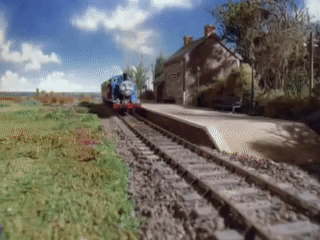
Like most American kids growing up in the 1990s, I first caught that blue locomotive and his pals on a PBS show called SHINING TIME STATION. It was a live-action show about some kids visiting their local train station, and the 4 1/2-minute THOMAS episodes would be a show-within-that-show. Usually the episode would relate to what was going on in the train station. The tales were told by a little man named Mr. Conductor, portrayed by the series' first UK narrator Ringo Starr in the first season, and then later by comedian George Carlin.
I have memories of watching that show with my paternal grandfather, when I was about... 3? I remember observing "The trains have faces... But they don't have cowcatchers." My grandfather and I would often draw train locomotives together, too. He'd teach me about the little minute details and such. Right down to the spokes on the wheels. That's part of why I'm an artist.
Anyways, let's jump ahead a little... I was 5, I hadn't seen that show in a while. Maybe because of scheduling, maybe I just wasn't watching that channel back then. Maybe I was watching VHS tapes more than watching TV...
One day, in the summer of 1998, I was given a VHS tape of a few of the THOMAS episodes on their own. SHINING TIME STATION episodes were barely released on home media, only the individual Thomas stories, and tapes were usually random grab-bags of episodes from the show's first 3-4 seasons. That first tape I got consisted of seven episodes, all in UK airing order no less, from season one. It was "James Learns a Lesson and Other Stories".
Now at that age, I had remembered watching the "trains with faces but no cowcatchers" show with my grandfather. I also still had my ERTL die-cast toy of Edward with two coaches that I sometimes played with... So I was like "Sure, I remember Thomas. I'll watch this."
That's where it all went downhill, lol.
And by my birthday and Christmas of that year, I was getting all these VHSes of the show and toys and such. I fit the cliche of autistic kid who was **addicted** to Thomas, add in that I used to identify as male. So yeah, the autistic Thomas boy stereotype through and through right here.
For my birthday that year, one of the VHS tapes I got was "A Big Day for Thomas and Other Stories". It was a compilation of Season 1 episodes, all narrated by George Carlin. Carlin would re-narrate all of the Season 1 and 2 episodes previously done by Ringo...
This was a weird tape, to say the least. It was rather short, and it had some episodes out of order. For example, the episode 'Thomas Breaks the Rules' ('Thomas in Trouble' in the UK) was the 2nd episode on the tape... But the episode that directly proceeds it, 'Toby the Tram Engine' ('Toby and the Stout Gentleman' in the UK) was at the *end* of the tape. Like, that story goes right into the 'Breaks the Rules' story. That's how the continuity was in the early series, as it closely followed the original books - THE RAILWAY SERIES. So it was weirdly out of order. Like watching AVENGERS: ENDGAME first, and then a few movies later, watching AVENGERS: INFINITY WAR.
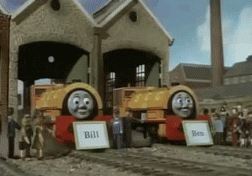
Second... On old Thomas VHSes, each episode had a small intermission before and after. A sequence of the characters, and white boards in front of them with their names on them. Thomas fans often call these the "Nameboard" sequences. They'd be a few seconds long, with the Thomas theme playing over them. They'd end with an image of Sir Topham Hatt/The Fat Controller, with the text "Next Story Coming Up Soon!"
Usually that screen was silent, or had the last bars of the Thomas theme playing over it...
But for some reason, on the "Big Day for Thomas" VHS... There was the sound of a whistle at the end of the nameboard sequence leading up to the episode 'Trouble for Thomas' ('Thomas and the Trucks' in the UK). Not any of the characters' whistles, but a more realistic sounding one...
Now, as a weird kid who was *easily* thrown off by things... 6-year-old me in 1998 was freeeeaked out by this. Like, why was that weird-sounding whistle there? Why this ONE tape and not all my other ones? Who's was it? Was this some... Secret character?
I was aware of characters I hadn't seen in episodes before... Maybe it was one of them? When I looked at the ERTL die-cast models in the catalogues, I would scope out some characters... For some reason, I thought that whistle would belong to one of the narrow-gauge engine characters. Like Skarloey or Rheneas or Duncan or Duke... For some reason, that's what I thought back then. They looked like engines that would have that whistle, to me!
Now comes something different...
At my maternal grandparents' house, this book was in a drawer in the guest room, among other books:

(image above is from an etsy listing. credit where credit is due.)
I'm assuming it belonged to one of my cousins, who used to stay there a lot when he was really young... And like any kid, I looked through whatever picture book there was. Looking at this book today, I will say that I find a lot of Greg Hildebrandt's illustrations to be very pretty.
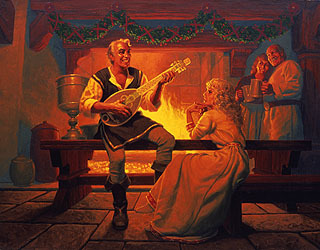
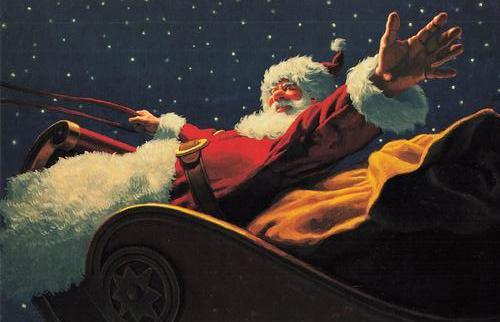
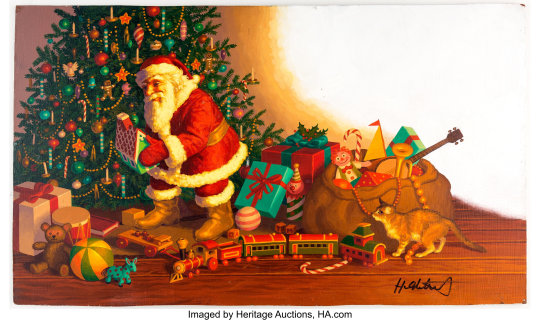
Also, it's kinda weird that I'm talking about Christmas in freakin' March, but here we are...
Anyways...
There was one illustration in that book that didn't quite sit right with me when I was little:
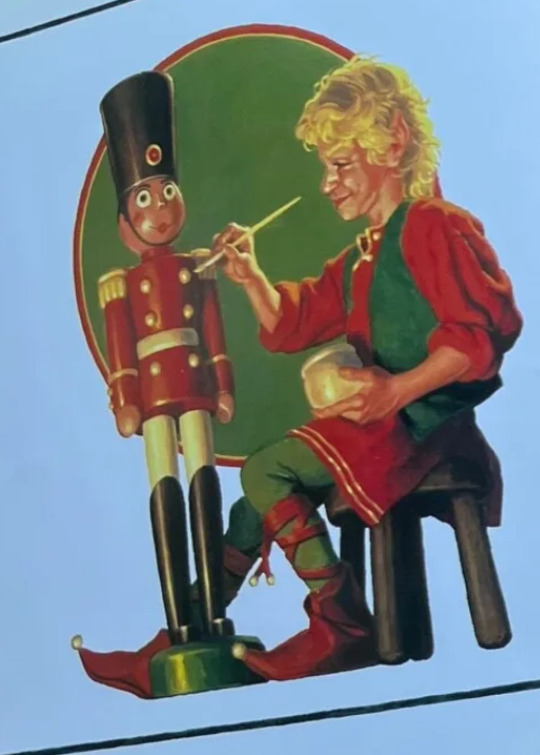
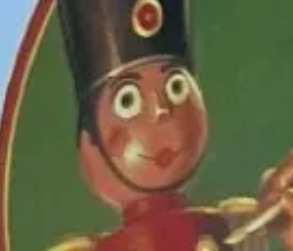
It had to have been those dead eyes, lol. How wide open they were, a black dot in a white circle, but on a wooden head and not a cartoon character...
The more I thought of it back then, the more it seemed like a Thomas character face... Albeit, a cursed one!
And I started conjuring up, in my mind, a secret Thomas character who had that off-sounding whistle heard on that *one VHS* volume. He had a face like that, and was darker-looking in his livery than the other engines. It's as if I was making my own Thomas creepypasta in my head, at age 6!! I don't recall drawing this engine though, he could've been an early OC for me!
Eventually, I'd find out that none of the engines had that whistle in the show... And that SHINING TIME STATION would return to TV in time for the release of the movie, THOMAS AND THE MAGIC RAILROAD. Some two years after I started getting into this show...
The whistle was from the show's George Carlin seasons. When he'd blow the whistle, it would go to the Thomas story. The same way Ringo Starr did in the show's first season, but his whistle had a different, higher-pitched noise. I had the SHINING TIME STATION Christmas episode on VHS, and that was with Ringo. So, back then, I didn't know that that whistle originated from SHINING TIME STATION.
But still, it was kinda cool that I was imagining this whole other Thomas character. A sorta more sinister and foreboding engine. Almost like a Sonic-dot-exe situation, that I thought up because I didn't like the sound of a random whistle that was nowhere to be heard in the show, that somehow got onto one part of a VHS volume I had, likely due to an editing error or something.
Some shadowy, creepy Nutcracker doll-faced engine lurking within the darker recesses of the show. Maybe if the tape deteriorated enough, you'd catch a glimpse of him amidst the fuzz... I imagined his nameboard, surrounded by thick dark grey smoke. For some reason, a name sounding like "Mico" coming up. Not at all the raccoon from Disney's POCAHONTAS, although "Nico" would be a good villain name for a cursed Thomas character.
And then the engine himself... just peering at me with those beady eyes as the shadowy smoke obscured just about everything else, during the night. It was like a gritty industrial setting more so than the roundhouse sheds...
The "Early Reel of 1983" ain't got nothin' on this one!
#thomas the tank engine#hyperfixations#autism#neurodivergent#weird fears when i was little#i was a weird kid#creepypastas
2 notes
·
View notes
Text
February 7: The Expanse 1x04
Why would you introduce my beautiful wife Captain Yao just to kill her one episode later??? I will riot in the streets.
Seriously, I really was like immediately attached to her, in a way I haven’t been to any other character in this show yet, and I was all ready for her to be a fave and now she’s gone. Truly a disappointment. Also it makes me kind of annoyed that Cop 2 is still alive because while I had no particular issues with him, having him be surprise alive in the same ep as another, worse, more definitive death… so sad for me specifically.
Second thought: my favorite parts of this show are the world building sections and my least favorite are the action sequences. All the tense life-or-death-situation scenes are really boring to me still. I mean admittedly action is not my genre in general but something about the action scenes in this show just seem particularly… flat, for some reason? I just feel no intensity and no urgency about them at all and I honestly kind of zoned out through them. In this ep, I’m talking specifically about the crew stopping up the wholes in the prison cell, and the run to the escape ship during gunfire.
But the world building is exquisite. I’m really into all the information we’re getting on Mars and how they see Earth—and themselves. Every new bit of information is simultaneously exciting and surprising and unpredictable, and also fits in perfectly with all of the other information, providing an overall picture of the society that feels coherent and real. And this even though we’ve seen very few Martian characters and not yet seen their home world at all.
I was also really excited about all the tech in the dead guy that the detectives were examining (as a side note, probably shouldn’t get attached to her, and I still don’t entirely get what she does, but Octavia is growing on me a lot). It sort of reminded me of Dollhouse in its future episodes except the tech was spread throughout the body instead of being mind-focused. Like, body mods, even data storage as part of the body mods, isn’t a NEW idea but it’s an idea I LIKE and I appreciated how they were developing it here. Also the term ‘gear head.’
I did not really get what was happening with the shootout in the corridor of the Donninger, which ended with that guy getting his arm blown off and then it just healed itself. Part of this is that as soon as the shoot out started I zoned out entirely because as I said, I just cannot care. So I probably missed important information. I think…he was one of the people who boarded the ship? One of the mystery antagonists? His space suit was different than the red-faced Martian ones. But they also called him a mole? Maybe? And something about a weapon that wouldn’t be able to fire. I probably should have rewatched the scene but I wanted to keep going. I also don’t know what it meant that his arm healed itself right away but based on the expression on Holden’s face, I think that’s supposed to be a mystery.
As far as I can tell, the mystery antagonists are OPA-aligned (based on the scene where the guy kicked all the Mormons off the ship he was building, and also the stuff with the guy being tortured in the first couple episodes) but there’s something Extra about them. The arm-healing thing, for one. Maybe it’s Mormon tech? LMAO.
Oh, just remembered. Another thing I like about the world building on this show is how normal Earth looks. Like clearly this is far in the future and there’s a lot of new tech and so on and so forth, and Earth from a distance looks quite different as well, with the degree to which it’s been built up at least in major cities—but it’s not all sleek futuristic houses or minimalism or just sweeping amounts of shiny new advanced entertainment etc. The houses are just houses, the clothes are just clothes, the people still read books and talk about dinosaurs. It makes everything feel more real and believable, and sort of helps ground the (sometimes very far out) worlds of this possible future with the actual world.
I was surprised by the insta-jump to found family among Holden and the crew. His insistence he needed to get back to ‘his people’ was a little meh for me, which I KNOW is completely unfair. The show has objectively earned the right to have him be protective of them, after their recent adventures and given that they’re the last survivors of their ship. But most of what we’ve seen from them has just been infighting… it’s hard for me to feel yet like they actually like each other and would be so deeply loyal. Meh. I don’t know. At least the most annoying of them has bitten the dust. I am not sad about it.
Also WHY are there so many Mormons? Are they like really important or is this just an extensive riff off a sort of joke (even in the future and even in space, white men in suits will try to evangelize you)?
4 notes
·
View notes
Note
Brutal ask game: 16, 20, 28!
Thanks for the ask bestie!! <33
16. Which is your favorite non-Dethklok song? Ex. Dory McClean, any of Toki’s musical numbers, etc
I love all of them but I think it's a tie between Toki's underwater friend's song and Takin' It Easy!! Underwater Friends is delightful and gets stuck in my head allll the time. Plus I saw it a few times growing up so it feels nostalgic <3 Takin' It Easy is just funny and it makes me really happy :]
(I also really like Murderfaces song from Dethsiduals because he's RIGHT! Why IS stuff so hard, why CAN'T everything be easy? It's not my favorite song but he gets me fr)
20. Your least favorite character?
Generic answer but Rockzo. He's got maybe.. three good jokes in the whole show, but most of the time he's just unfunny/annoying. The part where he's talking about being sober during Snakes and Barrels 2 is actually kind of unbearable. I hope he dies and goes to hell xoxo
28. What is your favorite death scene?
oouugh there are so many good ones! I think I'll go with the one from Writersklok? The visuals during that one are so good and Andromeda is such a good song. That sequence rules. But also the one from Fanklok is so funny so maybe that one? Hard to compete with people getting killed by Dethklok yaoi
Brutal ask game
2 notes
·
View notes
Text
one of the things I struggled with understanding in YKA was the conflicting depictions of bears. there was a sense that they were the "Other," "those who do not follow," deviants, or repressed female sexuality, but that felt at odds with the bear society shown to us by Ginko in episode 7. the conceit there seemed to be that on either side of the Door of Friendship are realms where people behave about the same. if that’s the case, how are the bears supposed to be the representation of what is excised from society?
what I’ve come to now is that the best way to read YKA is that the bear world and girl world are two levels on top of each other. maybe whether a character sees the bear world, or sees themself as a bear, has more to do with their perception of the world than anything else.
Lulu lives in a half-bear, half-human fairy tale where she's a princess but stops being the most important person in the world. Yuriika seems to be the only bear in her world growing up--she’s an abandoned cub trying to be a human girl well enough that she will be rewarded by love.
Ginko’s backstory was the part of the show that made me lose the thread the most, the war motif especially. it didn’t do much for me because it felt like it conflicted with everything else we were getting shown about this world.
however, taking the above approach, I think that the sequence is revealing of how Ginko sees the world and larger themes of the work. firstly, Ginko is also an abandoned child, a child who was almost purged. she sees herself and her peers as bears because to her the world is an animalistic fighting ground where the strong win. she gets taken in by the church and finds Kumaria, which gives her some kind of promise of being found and loved. she thinks she will get that if she does what she’s told, but instead, she’s manipulated into being a child soldier.
the war scene itself was hard for me to read. obviously it’s absurd, but again, I was tripped up by trying to understand the girls vs. bears metaphor. I think the idea is that people make up arbitrary reasons to fight and kill each other, defining themselves in contrast to the Other. and within groups, people purge others in order to solidify their bond. therefore, bears must worry about being associated with humans and humans must worry about being associated with bears, lest they face purging.
while I used to feel that that theme was a bit simplistic and conflicted with the conception of bears as the repressed Other of girls, now I think it works. the layering of these two themes allows the show to deal with both inner and outer division. the point of the Door of Friendship is that in order to connect with anyone as a person, you have to reach out to them in a way that requires you to let go of self-other distinctions.
Jung said, “the meeting of two personalities is like the contact of two chemical substances: if there is any reaction, both are transformed.” if you chose to be with someone, who you are is going to change, and change can be scary. it’s easier to stay hidden and unhurt. standing out can get you killed by those who’ve chosen to be invisible; however, that’s the only path to connection, authenticity, and wholeness of being.
#i love it when something in an Ikuhara work clicks for me and im finally like no that was genius#i was kinda in the middle on first watching YKA but then i was like omg the Virgin Mary themes were so good actually................#yka#commentary
14 notes
·
View notes
Note
I read through your Noel route fic a few days ago and had a lot of fun going through it! I've always been really fond of this kind of full-length canon divergence AU that explores an alternate timeline in detail and it's neat seeing yours come together. You do a great job mimicking the prose of the original Tsukihime
Some thoughts
Digging into the stuff with Tokie is a really smart choice for this. It's an obscure bit of canon that rarely gets touched on but it absolutely should have implications for Shiki's character. By its very nature a Noel route is going to involve pairing Shiki with an older woman leveraging a position of power to take advantage of him so it makes perfect thematic sense to spend some time thinking about Shiki's previous experience with that kind of thing and the ways in which it is and isn't the same. You do a good job grappling with it
You write an excellent Akiha. She's got ice in her veins her verbal lashings are delicious. Your Arihiko is great too
I'm a little confused about the sequence of events that leads to Akiha selecting Noel as Shiki's tutor. Noel sends home a fake report card with arbitrarily lowered grades for Shiki on the first day in the hopes of getting his family to hire a tutor for him and then Akiha attempts to hire one and Noel does something to prevent any other female candidates from applying? But a lot of it seems to rely on Akiha taking actions that Noel has no control over - deciding to hire a tutor at all, agreeing to hire Noel when she’s the only candidate instead of just getting someone from farther away, etc. I’m also quite surprised that Akiha seems to actually like Noel here - I would have thought her flighty unreliable personality would be something Akiha can’t stand
The original Tsukihime mostly used its (consensual) sex scenes as an emotional climax close to the end of a route cementing the main relationship after spending a long time with Shiki and the heroine slowly growing closer. It’s kind of neat reading a route that takes the opposite tack - a ton of sex scenes early on while the characters still know almost nothing about each other. Noel’s a sexually frustrated adult woman hitting on a student, not a teenage girl looking for love so I think this makes a lot of sense for her
If I’m tracking things right Arc should have resurrected, went to look for Shiki, and gotten chased by Vlov’s minions while Shiki stayed at Noel's apartment. Without Shiki to push her into confronting Vlov sooner I imagine she’s going to lay low for a while to build up her strength and then show back up in a few days at full power unimaginably pissed off. I’ve been liking this whole alternate sequence of plot developments a lot and I’m interested in how far it’s going to diverge by the end. It’s very funny that Arc’s initial assumption that her killer is a church agent will turn out actually be true by the time she catches up with him in this timeline
As a sidenote, writing fanfiction for an incomplete canon like this is an interesting writing challenge. TsukiRe sets up a ton of mysteries for the far side and while we can assume answers to some of them (Arach being the spider DAA is obvious) there are others where it's a lot less clear what's going on and any fic is forced to choose between carefully skirting around the plot point and just making up something while acknowledging that in a few years it may be invalidated by the other half of the game. You've done a solid job handling it so far
Noel’s relationship with Ciel is by far the most interesting and complex part of her character and I’m really excited that the next part of the story looks like it’s going to start exploring it. So far Noel has managed to mostly hide the stuff that’s really wrong with her from Shiki but the further in he gets the more he’s going to realize how broken she is
Ending things here with Shiki’s vampirized classmate calling Noel out for her bullshit and getting stabbed by Shiki for it is fun. She’s really speedrunning stuff - it’s been under a week since she got hired as a teacher and she’s already fucked the student she went on an undercover mission to investigate in the first place and dragged him out at night to help her hunt vampires. Zero professionalism. It seems unlikely that she has any real feelings for Shiki either - he’s cute and she’s fond of him but at this point she’s just using him for sex and professional advancement
I’m interested to see where you’re going with all the Nanaya stuff. It’s not quite a full alternate personality but Shiki changes a lot when he swaps into that mode - the narrative voice becomes a lot more masculine, aggressive, and misogynistic, Shiki’s actions become much more aggressive and dominant, etc. You do a good job distinguishing the two. One thing TsukiRe does with this that hasn’t come up here yet is that when Shiki swaps into this mode in combat he starts doing a lot of numerical computation, counting times, speeds, distances, like his brain is automatically calculating the most efficient route to kill
This is less writing feedback and more copyediting but you should do a pass on the earlier parts of the story to edit for tense consistency. You shift back and forth from past tense to present tense a lot (this is actually relatively accurate to how VNs are written in japanese but it sounds wrong and is disorienting in english)
Some minor canon accuracy nitpicks that don’t matter but I’ll bring up anyway: The Tohno mansion is at the top rather than the bottom of a hill, Shiki only returned to the mansion once after the incident and it was so Makihisa could dismiss him, Makihisa’s study and Akiha’s study are separate rooms at opposite ends of the mansion
This is very much a matter of personal preference but the erotic scene that stood out the most to me here was actually the makeout scene at the lockers near the beginning. The tension of being desperately attracted to each other but knowing that you shouldn’t act on it and forcefully tearing yourselves apart is very hot. In comparison the later scenes where they get to actually have sex relieve tension rather than building it and aren’t as impactful to me
As a final note you should put this fic up on Ao3 so that it’s easier to find! That’s the first place most people looking for english language fanfiction will check (tragically the community of people writing english language fanfiction for Tsukihime isn’t very large to begin with but some readers is still better than no readers)
Thank you so much for reading and thank you so much for the feedback!! It brightened up my day!!
I definitely see what you mean about being confused as to why Akiha would choose Noel in retrospect, I don't think I explained that well enough. I might have relied too much on coincidence actually, since it's supposed to be Noel's plan, and the main reason Akiha picked someone from Shiki's school is because of his anemia attack during dinner. It makes sense that Noel could narrow things down on her end, but it makes less sense for her to have been able to get Akiha to pick someone from his school in the first place. Hopefully I can come up with something lolol
And as for Akiha getting along with Noel initially, it's more that Akiha was interested in embarrassing stories about Shiki, which Noel happened to have, and less actually liking her as a person. Their relationship will get really rocky as the story goes on.
It's not much of a spoiler to say Arc does indeed resurrect. I'm gonna do some interesting things with her but she unfortunately won't get too much of the spotlight this time around. Not for a while, anyway.
For writing for incomplete canon, yeah Part 2 is definitely going to have some Fullmetal Alchemist (2004) moments where I'm going to purposefully deviate from canon, and if I feel like it, I may go back and retroactively change things as new entries come out, or maybe I'll just leave it as is and have it be an AU. That's definitely going to apply to Saiki Gotou, but despite there already being some evidence of what Dr. Arach is, I'm actually going to purposefully do something different with her as well.
With Noel, she has the unrealistic and unachievable goal of "a normal life" which, to her, means getting back the old life that she had. Barring that, she at least wants something that resembles what everyone else has, so everything else is just a means to an end. You are entirely correct that she doesn't have real feelings for Shiki, but I think the fact that she took being called stupid 'so' hard because it was coming from Shiki shows that she's 'starting' to see him as more than just a pawn.
Plus, she did ultimately choose to save Shiki by calling Ciel, rather than leaving him to die or risk trying and failing to save him by herself. Noel's arc is going to center around what it even means to have a normal life, which is a big part of why I used that song to close out the chapter. She's realizing at that point just how incompatible she is with the life that she wants for herself.
I really should do like 7 or 8 more once-overs, lol. I had a deadline and I wanted to meet it, but when I started, I was doing past tense just because that's kind of the default, but I eventually realized that doing present tense reads better for Tsukihime, and went back and retroactively changed as much of the past tense stuff as I could find, and even still there were times when I'd accidentally slip back into past tense and be like "wait DAMNIT" and go back and change a bunch. It doesn't surprise me that I missed some, lol. I also notice that I have a really bad habit of repeating words either in the same sentence, or one sentence apart. Like "it's time, now. We're going now." or something like that. very bad habit, lol.
I was wondering what you thought of the extra chapter with Noel at the monastery. I put it there to try and build tension for the eventual reveal of what actually happened when Shiki's memory was blocked out that night, like "oh no did he..." But also I wanted to portray an idea of what it must've been like for Noel growing up after the French incident. There's a throw-away line where Noel thinks about what'll happen if she gets discharged, and that they'll send her back to the chapel, and she says something along the lines of "I can't survive there anymore." So I figured I'd flesh that out to make Noel a bit more obviously sympathetic, instead of having readers infer what her life must have been like based solely off of the things she says.
I also wanted to define Noel's "powers" more. In the source material, it just says she uses "sacraments" but that can be one of two things, either equipment the church gives you, or literally just magecraft that the church conveniently calls "miracles" or "blessings from god" or whatever. I wrestled over whether I wanted Noel to actually be considered a "magus" especially since that whole dichotomy technically works differently in Tsukihime, but afaik it's not as well defined as it is in Fate, so I'm actually leaning more towards Fate lore for how her powers work, and hoping it's not 'that' different from TsukiRE. I mean Melty Blood Type Lumina literally opens every round with "Open Your Magic Circuits" sooo, lol
As for AO3, I'll give it another look, but last I checked they didn't have an option to embed word/pdf files, which might mean I'd have to axe the images, which I'd really rather not. Also I think there was a 50k word limit so I'd also have to split it up into multiple chunks.
But yeah again thanks so much for your feedback!! It means a lot!
2 notes
·
View notes
Text
Obi-Wan Kenobi Part I Thoughts
I've watched the first episode of the Obi-Wan Kenobi show...and I have thoughts. Spoilers below.
I spent the evening watching Revenge of the Sith in preparation for Obi-Wan Kenobi dropping Friday, and originally I wasn't planning on watching the episodes until Friday night. But when I was about an hour from finishing ROTS, the news came across Twitter that they were dropping the episodes in an hour. So I was perfectly set up to go straight from the angst of ROTS to the angst of the first Obi-Wan episode. But I am saving episode two for Friday night still...have to have something to look forward to ;)
The prequel recap set the tone perfectly. Well chosen scenes and lines, and hearing Padme naming the twins as we saw them being handed off was perfection.
Seeing yet another Order 66 scene was...difficult. I get why it was there (Reva was one of the younglings in that group, I assume), but definitely difficult with the context of this week.
The introduction to the Inquisitors was chilling and further drove the tone. I haven't yet watched Rebels (though I know a lot of the broad strokes of the show), so it was good to get the "backstory" right off the bat. And oh Reva, you are already so close to Kenobi and you don't even know it.
Obi-Wan working in a meat packing facility just...broke my heart a little. He looks so defeated. I love his relationship with the eopie. It breaks my heart he's literally living in a cave. Also heartbreaking? How he spent some of the few credits he had to get Luke a toy (a very familiar one - I see you there, Easter egg), that Owen promptly threw back in his face. I get Owen's protectiveness, but don't beat up on Obi-Wan like that!!
I liked that Obi-Wan has a familiar relationship with a Jawa - I'm sure this ties back around to him taking the time to burn the Jawas in A New Hope - though the Jawa really needs to lay off telling poor Obi-Wan he needs soap ;)
The nightmare sequence, like the prequel recap, further hit the nail on the head with the well chosen scenes. I can believe that he's spent almost every night since Mustafar with some variation of those nightmares. And it broke my heart again when, after waking up, he called out for his Master...who he apparently has not yet learned to communicate with. Hopefully by the end of the series...?
Obi-Wan's encounter with the other Jedi just further established how far he is from that Jedi Master we saw in ROTS. He is truly broken and hasn't started to heal yet from the events of ten years before. Break my heart some more, why don't you, Obi-Wan??
When I was watching ROTS earlier this evening, I had the thought, "I really wish we could see more of Alderaan on Star Wars shows." Because we've spent tons of time on Tatooine, but we had oh, two minutes of screen time of the planet Leia grew up on? It didn't feel like enough.
When the screen switched to show a city in front of mountains, I gasped and then started grinning. I was also shocked that I hadn't seen a whisper of this spoiler anywhere. But oh, was I glad that I hadn't, because the payoff of seeing Breha Organa, little Leia Organa, and then Bail Organa was so worth it. I can absolutely see both Anakin and Padme in Leia, and I can see bits of the woman she grows into in this spunky little girl. I love her relationship with both her parents and how she casually took down her cousin.
When I first saw the guy watching her in the woods, I thought, "Oh, can Vader go without his helmet?" I know, weird train of thought, but it makes much more sense where they went with it, of course. More on that shortly.
Owen was equal parts devastating and ridiculously amazing in the scenes with Obi-Wan and Reva. If anyone dares question how deeply that man loves his nephew and wife...he just calmly resigned himself to sacrificing himself, and I respect that fiercely.
One thing that I think this series will bring out is how loved and cared for both Skywalker twins were. I think fandom as a whole seems to overlook that, since by the time we met Luke and Leia in A New Hope they were adults ready to step out into the world and away from their homes, but they both were raised by families who would do anything for them.
And that brings us to the kidnapping. We all knew that something had to prompt Obi-Wan to leave Tatooine, and I honestly thought it was that Obi-Wan was trying to draw the Inquisitors away from Tatooine and Luke. The fact that instead, it's because Obi-Wan has to go protect the other twin for a while...makes complete sense to me.
I loved seeing the emergency holocall, and when that didn't work, Bail just showing up in person to shake Obi-Wan out of his stupor. And I completely adore that Bail called Obi-Wan out on not just looking after Anakin and Padme's son, but that boy's sister, too. I have gotten frustrated with Obi-Wan in the past for kind of ignoring Leia and her potential, so it was lovely to have someone call him on it.
I giggled when Obi-Wan went out to the desert and started digging up his lightsaber, especially since he'd told the other Jedi to bury his lightsaber in the desert. But then my heart hurt all over again when he opened the box and there was Anakin's lightsaber right alongside his.
And of course we find out that Obi-Wan is walking into a trap. I loved Reva's wording, of "He fought beside her father in the war", because I'll admit, my brain first went to "Yes, he and Anakin went everywhere together" until I realized that no, she was of course talking about Bail Organa, not Anakin Skywalker. Can I blame just finishing the most excellent book Brotherhood? No? That's okay, I have a feeling that wording was very deliberate...
And off Obi-Wan goes on board public transportation with his lightsaber. It's a trap!
I have so many more thoughts and feelings, but mostly, that it's wonderful to see Obi-Wan Kenobi back on my screen, continuing and enhancing the story that I love so much. And I loved every minute of the first episode.
#obi-wan kenobi#obi-wan kenobi spoilers#obi-wan spoilers#kenobi spoilers#star wars spoilers#star wars#owen lars#luke skywalker#bail organa#breha organa#leia organa#obi wan kenobi#obi wan spoilers#obi wan kenobi spoilers#reva#third sister#fifth brother#grand inquisitor#jedi order#jedi#teeka#jawas#tatooine#alderaan#revenge of the sith#rots#brotherhood#my meta#my reviews
24 notes
·
View notes
Text
scattered thoughts on hotd (1x07, 1x08)
- so like....why? why are we rushing through every single plot point. the pacing of this show is bonkers. BONKERS. 1x07 alone could have taken half a season of TV. HALF A SEASON. that entire montage of laenor’s fake death was absolutely terrible. that entire episode just beggared belief. and i. don’t. get. it. this is HBO, they can afford to give this show more seasons. why are they rushing thru this??? it just seems sloppy and weird
- which brings me to daemon and rhaenyra. that whole reunion felt like such a letdown. they couldn’t have let it play out for two episodes, maybe? the whole thing was awkward and not very believable. emma d’arcy is a very good actress, but she seems to have far less chemistry with matt smith than young rhaenyra, imo. and this isn’t an emma problem, it’s a writing & directing problem. terrible lighting aside, daemon and rhaenyra’s scenes were rushed and poorly written. they needed 2-3 episodes to come together again and start plotting, not like...15 minutes and a montage?
- that whole laenor sequence was just....so dumb. like truly jumping the shark kind of moment. house velaryon has become a complete joke at this point (and the next episode only reinforces it...). the way they’re breezily getting rid of black ppl without even so much as a coherent narrative....anyway
- and where are the consequences for ppl’s actions? none of these ppl’s outbursts of violence seem to matter or suffer any ramifications. and it all goes back to that terrible wedding in episode 5 where criston cole was just allowed to walk away from murder. ever since then the believability of this show has been eroded.
- and again!!! it’s the pacing!! like, yes, there should be actual consequences but we should see them play out in time! laena’s suicide and laenor’s fake death would have felt v different as complex arcs that lasted more than 5 min of screen time!!
- sorry, can’t shut up about the pacing because it’s just screwing up everything. for instance, i’m finding the kids/teens a lot more interesting than the adults, but we could have spent more time with them as kids! again, why the fucking rush. we could’ve seen baela and rhaena grow up, we could’ve seen the fraught dynamic between alicent’s kids! idk man, i would’ve watched all of that!
- that being said, the best parts of these last two eps for me have definitely been alicent, who is the toxic & tragic queen of my heart, and viserys who embodied so much humanity and grace in his send-off.
- but i just!!!! SLOW DOWN. i’m so annoyed. there’s good writing here too that’s being rushed out of existence!! stop it!!
- helaena was also a fave in 1x08. she’s delightful, no one deserves her, 10/10
- shipping all the teens together, cuz their parents are just boring at this point (i can’t believe they made daemon and rhaenyra boring for me...but alas!)
- aemond/daemon looks, “game recognizes game” moments 10/10
10 notes
·
View notes
Text
Thoughts on the Deemo Movie
Although my understanding of spoken Japanese is more than pretty bad, I was still able to understand a less than semi-decent amount of dialogue... so here are some of my thoughts of the Deemo movie.
Spoilers below.
Animation style of the characters aside (I am not a fan), in my opinion, the pacing of the overall movie is a bit too fast. First, there’s a lot of switching between the present day and Alice’s flashbacks, and they frequently make things feel unnatural. For example, when the girl is crying about how she doesn’t remember her name, the scene switches to Sania and Rosalia introducing themselves to Alice outside of class, with her introducing herself to them, and then the movie switches back to young Alice’s perspective, with her suddenly remembering her name.
That speed also applies to Alice’s relationships, as none of them are really explored or developed very well. For Valensky, he’s more or less introduced as Alice’s teacher, shown that he’s watching over Alice in one scene, and then towards the end of the movie, he’s the one explaining everything about Hans to Alice (I didn’t understand most of what he said during that part). Similarly, for Sania and Rosalia, while there’s a bit more time spent to show how they become friends, it also felt rushed. In one scene, Alice is found by Sania when working on a piece of music that she’s having difficulty with (to my understanding)... and then the next time Alice sees Sania, the latter is working on her interpretations of the score with Rosalia the next time they see each other? And then Alice joins them, just like that?
At the very least, Celica does come across as antagonistic when she’s introduced, as she still sabotages Alice... but as soon as the “damage” is “repaired”, it’s like she completely ignores how she doesn’t want Alice to succeed in growing the tree and helps Alice with moving forward, and while she doesn’t try to stop Alice again, she does try and hinder Deemo a bit when they’re on the top floor of the castle.
As for the scene on the stairs until when Alice wakes up in the hospital... I probably dislike that portrayal of that part of the game’s events over everything else. A number of actions taken by both Alice and Deemo were removed, including the part where Alice looks away as she goes home, and that made the whole sequence feel significantly less emotional.
Also: why did they have to change how Hans obtained Mirai? I know it’s a miscellaneous detail, but did the movie have to do that? There’s a graphic that shows Hans bought Mirai from some toy store!
The movie itself thankfully does has a bunch of ‘new’ non-game content, and it’s not limited to just the non-original game characters interacting with each other, or with Alice... though based how the original story was adapted, I would sincerely advise that anyone who hasn’t finished playing the main game to not watch the movie.
Overall, the movie was rather light-hearted, and the usage of the soundtrack was excellent. As a pianist, I especially appreciated how the visible sheet music matched the songs being played (this is an assumption for everything aside from the song that Alice is trying to remember as I put those notes into a score to hear them), and how the piano playing itself was animated as animations for playing the piano are normally monotonous and almost never match the correct keys being played (Not certain that this happened all the time for Deemo though).
I’m likely going to watch it again later once the official English version is released... unless it’s a dub.
10 notes
·
View notes